Allama Iqbal Essay in English (Easy and Outstanding)
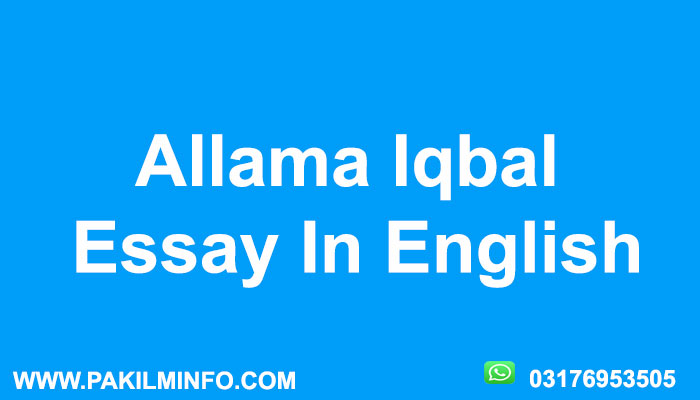
Here I am going to write an Essay on Allama Iqbal in English . This is a very simple and easy-to-learn essay in English for all class students. Every student can prepare Allama Iqbal Essay in English from here according to his/her choice.

Allama Iqbal Essay in English (Easy)
Allama Iqbal is our national poet. Allama Muhammad Iqbal” was born in Sialkot on November 9, 1877. His forefathers came from Kashmir. His father Shaikh Noor Muhammad was a pious man. He passed his Intermediate examination from Murray College, Sialkot.
Read: Allama Iqbal Essay in English for Childs
Syed Mir Hassan taught him Arabic, Persian and Islamic studies. He did his M.A. in Philosophy from the Government College, Lahore. He went abroad for higher education. He had the degree of Bar-at-Law. He went to Germany and got a degree of Ph.D. He came back to his country.
He wrote many poems to awake the Muslims. The Muslims were poor, uneducated and lived in very unhappy conditions. Being the national poet and a thinker, he taught the Muslims a sense of self-respect, In 1930 at Allahbad, he gave the idea of a separate homeland for the Muslims of India.
He passed away on the 21st of April, 1938. He was buried outside the Badshahi Masjid in Lahore. Bang-e-Dara, Baal-e-Jibraeel, Zarb-e-Kaleem and Javed Nama are his famous books.
Allama Iqbal Essay in English for Class 10 & 12
Birth of allama iqbal:.
Allama Muhammad Iqbal was born on November 9, 1877 in Sialkot. He belonged to an ancient family of Kashmiri Pandits. His forefathers converted to Islam two hundred and fifty years ago and emigrated from Kashmir and settled in Sialkot. Allama Muhammad Iqbal was fortunate in that he got the opportunity to be blessed with the training of good and virtuous parents. His father Sheikh Noor Muhammad was a Sufi man. His mother Mohtarma Imam Bibi was a wise woman.
Read: Allama Iqbal Essay in English for Class 6
Early education:
Allama Muhammad Iqbal’s early education, like that of ordinary Muslim children, took place in the school according to the custom of the time. Then he entered Mission School Sialkot. He was intelligent from childhood. He passed the fifth class examination with a scholarship and also got a scholarship in the last grade of middle school. He also achieved a prominent position in the inter-class which was the basis for admission in the college.
Discipleship of Maulana Mir Hassan:
When he entered the Scotch Mission College, Sialkot. He had the opportunity to make regular use of Maulana Syed Mir Hassan, a very capable teacher of Arabic and Persian. Allama Muhammad Iqbal studied up to FA in Sialkot. After that, he was sent to Lahore to get higher education. Scotch Mission College was not called Murray College at the time.
Education in Lahore:
Allama Iqbal came to Lahore in 1895 and entered Government College Lahore. His subjects here were English philosophy and Arabic. In 1997 he passed the BA exam and came first in the Arabic subject and won two gold medals. At that time Professor Thomas Arnold was a famous teacher of philosophy.
Allama Muhammad Iqbal had his own tendency towards philosophy and he got the opportunity to be a student of a famous philosopher like Arnold. Allama Muhammad Iqbal took admission in MA Philosophy in 1997. After passing his MA, he started lecturing on history, philosophy and politics at Oriental College, Lahore.
Read: Allama Iqbal Short Essay in English for Class 2, 3, 4 and 5
Higher education:
Allama Muhammad Iqbal traveled to England in 1905 for higher studies in philosophy and law. He passed the barrister’s examination from the University of Cambridge and later obtained the degree of Doctor of Philosophy from the University of Munich, Germany.
He also served as a Professor of Arabic at the University of London for six months, as deputy of Professor Arnold. After that, he returned home with many academic honors and degrees. He mastered Arabic, Persian, Sanskrit and many European languages.
Return to Home from Abroad:
After completing his higher education, he decided to return home and arrived in Lahore in 1908 where he received a warm welcome. He started practicing law in Lahore and also taught philosophy for 18 months at Government College, Lahore. Because Mr. James, the college’s professor of philosophy, had died and no English teacher could be immediately appointed in his place.
Poetry of Allama Iqbal:
Before moving to Europe, his poetry was limited. He used to write poems about the nation and homeland. Most of his poetry was in Urdu. After returning from Europe, his poetry changed and he started reciting poetry mostly in Persian. His Urdu poetry became famous even before 1901. He wrote a philosophical Masnavi Israr Khudi which was published in 1915. This Masnavi became more popular in England than in India.
Professor Nicholson published an English translation of the Masnavi. In this way, the Western world became acquainted with the ideas of Allama Muhammad Iqbal. Renowned critic Professor Dixon commented on the Masnavi in detail and praised it. This had a great effect on the British government and in January 1923, Allama Muhammad Iqbal was honored as “Sir”.
Ethics and Dress:
Although he was educated in English, led a pious and simple life. He spent most of his time studying. Eaten only once in 24 hours. Even during the health issues, his style was such that there was no difference in daily routine. He met his visitors with the same smile and warmth as he had in health.
He wore a kurta and shalwar in the early days. He wore a white turban or a loincloth. However, when he went to Europe, he had to wear English clothes. When he returned, he usually wore a Turkish hat with a shalwar kameez and a coat. Sometimes he wore a coat and trousers. By the way, he did not like English clothes.
Patriotism:
Allama Muhammad Iqbal was against the political disintegration of patriotism. Patriotism was ingrained in him. He was very attached to his homeland and this is a natural passion. His homeland was Kashmir. He expressed his love for Kashmir in various ways. He was also the secretary of several Kashmiri associations
The love of the Prophet (peace and blessings of Allah be upon him):
Allama Muhammad Iqbal was a figure of non-Islamic. The Holy Prophet (peace and blessings of Allah be upon him) could not tolerate the slightest disrespect to Islam and the greats of Islam. The love of the Prophet (peace and blessings of Allah be upon him) was embedded in their veins and fibers. Had Allama Sarwar Kainat (peace be upon him) been mentioned, Allama Iqbal’s tears would have flowed. In his words, devotion to the person of the Holy Prophet (peace and blessings of Allah be upon him) is expressed.
Death of Allama Iqbal
He died on 21 April 1938 and was buried near the main gate of Badshahi Mosque Lahore.
More Essays in English:
Courtesy Essay for 10th Class with Quotations Libraries Essay for 10th Class with Quotations Plastic Pollution Essay in English for Students Save Water Save Earth Essay in English A True Muslim Essay with Quotations
2 thoughts on “Allama Iqbal Essay in English (Easy and Outstanding)”
Add quotes in essay
Very nice essay.Its like very simple and easy in my opinion.i would rate this approximately 8.5/10😀😀😀
Leave a Comment Cancel reply
Save my name, email, and website in this browser for the next time I comment.
- Skip to primary navigation
- Skip to main content
- Skip to primary sidebar
500 Words Essay on Allama Iqbal in English

by Cherie McCord
Allama Iqbal was undoubtedly a prestigious National hero born in Sialkot. He was an outstanding poet-philosopher and political leader. However, writing an essay on such great personalities requires enormous time and research to do complete justice. Hence, availing help from expert essay writers can make your life easier. They perform detailed research and write an essay that surely entices the readers.
500 words Complete essay on Allama Iqbal in English. You can use the Allama Iqbal essay as my favourite poet, hero, and personality as well. Allama Iqbal is the national poet of Pakistan. He was born in Sialkot in 1877. After completing his primary education in Sialkot, he moved to Lahore for further studies.
He did his MA in philosophy there and taught for some time in the GC Lahore. After that, he went to Germany for his PhD in philosophy.
At that time, English were the ruler of India. They were trying their utmost to confine Muslims to the cages of slavery and ignorance. Therefore, the situation of Muslims was pathetic during that time. They were not offered high-rank jobs in Government.
Iqbal, being a well-wisher of Muslims, tried to awaken them from the deep sleep of negligence. He used the power of poems and verses to give Muslims of the subcontinent a light of hope. He reminded them of the achievements and standards of their forefathers.
Visit essayservice.com for best eassy writing services.
Table of Contents
Essay on Allama Iqbal Quotes
I lead no party; I follow no leader. I have given the best part of my life to careful study of Islam, its law and polity, its culture, its history, and its literature Allama Iqbal
Nations are born in the hearts of poets, they prosper and die in the hands of politicians. Allama Iqbal
Two Nation Theory by Allama Iqbal
He also wrote letters to Quaid-e-Azam to work for his depressed nation. In his Allahabad session, he gave the solution to the problems of Muslims in the form of Two Nation Theory. He believed that Muslims are different in every aspect of life from Hindus. He suggested that Muslims should work for getting their own homeland.
Iqbal as a Poet
Iqbal was a great poet. The goal of his poetry was to remind the Muslims of their glorious history. His poetry highlighted golden Muslim traditions and achievements. Every verse by Iqbal gave Muslims a wake-up call to regain their respect. It is full of permanent national feelings.
Teachings by Allama Iqbal
He wrote poetry both in Urdu and Persian. His verses give reference to the Holy Quran. It gives a sense of spirituality and morality. In this age, Muslims need to get guidance from his poetry. He is our hero and one of the people who laid the foundation of Pakistan.
Allama Iqbal died on 21st April 1938 due to severe throat infection. May his would rest in heaven. May his words continue to inspire young generations to follow the path of self-esteem.
We hope that this essay on Allama Iqbal has provided you enough information to use it in 9th, 10th, first year and second year classes and you won’t need to ask expert essay help from someone from Write My Paper Hub for writing your own paper on similar topics.

Allama Iqbal Essay in English with headings
Table of Contents
Allama Iqbal Essay:
Allama Iqbal Essay includes early life, education, literary and philosophical contributions, and enduring legacy.
Throughout British India’s history, Allama Iqbal was known as a great poet, philosopher, and politician. Muhammad Iqbal was his full name. Iqbal holds a special place in British India’s history as a great poet, philosopher, and politician. As a result of his literary and philosophical works, Iqbal shaped the mental image of prosperous Muslims and supported their rights and identities. His intellectual heritage is shaped by his conceptual divine endeavors, Islamic polemics, and visions of a separate Muslim state in the Indian subcontinent.
Early Life and Education:
Sheikh Noor Mohammed, the father of Mohammed Iqbal, was a devout Muslim who instilled in him a love of religion and education. He completed his early education in Sialkot and soon showed great talent in words and poetry. After completing his primary education, he got a Bachelor of Arts in Philosophy and Literature from Lahore State College.
Iqbal’s education led him to study in Europe, where he learned about Western philosophy and literature. He holds a master’s degree in philosophy from the University of Cambridge and a doctorate from the University of Munich in Germany. During his stay in Europe, Iqbal was influenced by the writings of Western philosophers such as Friedrich Lohr and Henri Bergson. Although influenced by Western philosophical thought, he sought to reconcile it with his Islamic heritage.
Literary and Philosophical Contributions:
Allama Iqbal’s literary and philosophical works are known for their profound, solid, and deep light. He composed his poetry mainly in Persian and Urdu, which allowed him to reach a wide audience throughout the Muslim world. Allama Iqbal’s poetic expression could combine ancient and modern themes with Islamic spiritual and philosophical expression. Some of his most famous books include “Israr Khudi”, “Rumoz-i Abkhudi”, “Bang-e-Dara”, and “Pigham-e-Mashriq”.
In “Mystery of Self” he outlines the individual’s journey of self-discovery and highlights the importance of realizing one’s inner potential. In “Symbols of the Rapture” he examines the concept of self-emptying and advocates for a description of the unity of humanity. Allama Iqbal’s poetry often presents the opportunity to follow Muslims to rediscover their lost glory, embrace their heritage and strive for the achievement of higher goals.
Political Vision:
Allama Iqbal’s political ideas influenced the Muslim Ummah in a very positive and dynamic way. Iqbal’s political concept was based on his literary and philosophical principles, which came through in his poetic and theoretical work.
Concern for political unity:
An important aspect of Allama Iqbal’s political vision was the concern for the unity of the Muslim Ummah. He informed the Muslims to ally their specific interest. Iqbal’s dream was for Muslims to regain their historical glory and revive their Islamic heritage. He realized the need for a political revolution, which would mobilize Muslims to secure their rights and properties.
The concept of a self-defined Muslim state:
Another important political concept of Allama Iqbal was the concept of a separate Muslim state. In his Allahabad Address of 1930, he proposed the creation of a separate country for Muslims. He believed that Muslims needed a separate homeland where they could enjoy independent Islamic rule. This vision of Iqbal later paved the way for the creation of Pakistan, which was achieved in 1947.
Political Implications of Ideological Principles:
Allama Iqbal’s political concept was based on his ideological principles which he expressed in his poetry and philosophical work. He promoted self-discovery, which encouraged the development of self-identity and recognition of one’s inner potential. His growing self-consciousness in his poetry flags the formulation of principles of unity.
Allama Iqbal’s philosophical principles did not limit his period in the field of politics. He participated in activism and faced the political and social challenges faced by Muslims in the Indian subcontinent. Iqbal was sure that Muslims must form alliances to protect their interests and preserve their identity. In his famous Allahabad Address in 1930, he highlighted the concept of a separate Muslim state for the Muslims of India.
In his address, Iqbal envisioned a separate country for the Muslims of India where they could freely practice independent Islamic beliefs, culture, and traditions. Their concept of Pakistan was confirmed later when in 1947, the leadership of the Muslim League created a separate Muslim country from India.
Enduring Legacy:
The legacy of Allama Iqbal’s literary and philosophical work is vital in the Muslim community in the Indian subcontinent and around the world. His poetry admonishes men to seek spiritual enlightenment, and his philosophical thoughts serve as guiding principles for those seeking the ultimate goal.
In Pakistan, Iqbal has been declared the national poet, and his birthday is a national holiday. His poetry is recited in madrasahs, public gatherings, and cultural events, reminding people of the principles of his sphere: unity, self-identity, and the pursuit of higher goals.
Allama Iqbal was not just a poet or a philosopher, but a visionary whose ideas influenced the destinies of millions of people. His poetry remains a beacon to this day, and his philosophical ideas have shed light on various traditions. When we recall the life and work of Allama Iqbal, we realize the power of literature and philosophy to defeat the natural chances of nations at times and influence the course of history.
Related Topics:
Essay Quaid e Azam Muhammad Ali Jinnah

Essay on Allama Iqbal (700 Words) In English
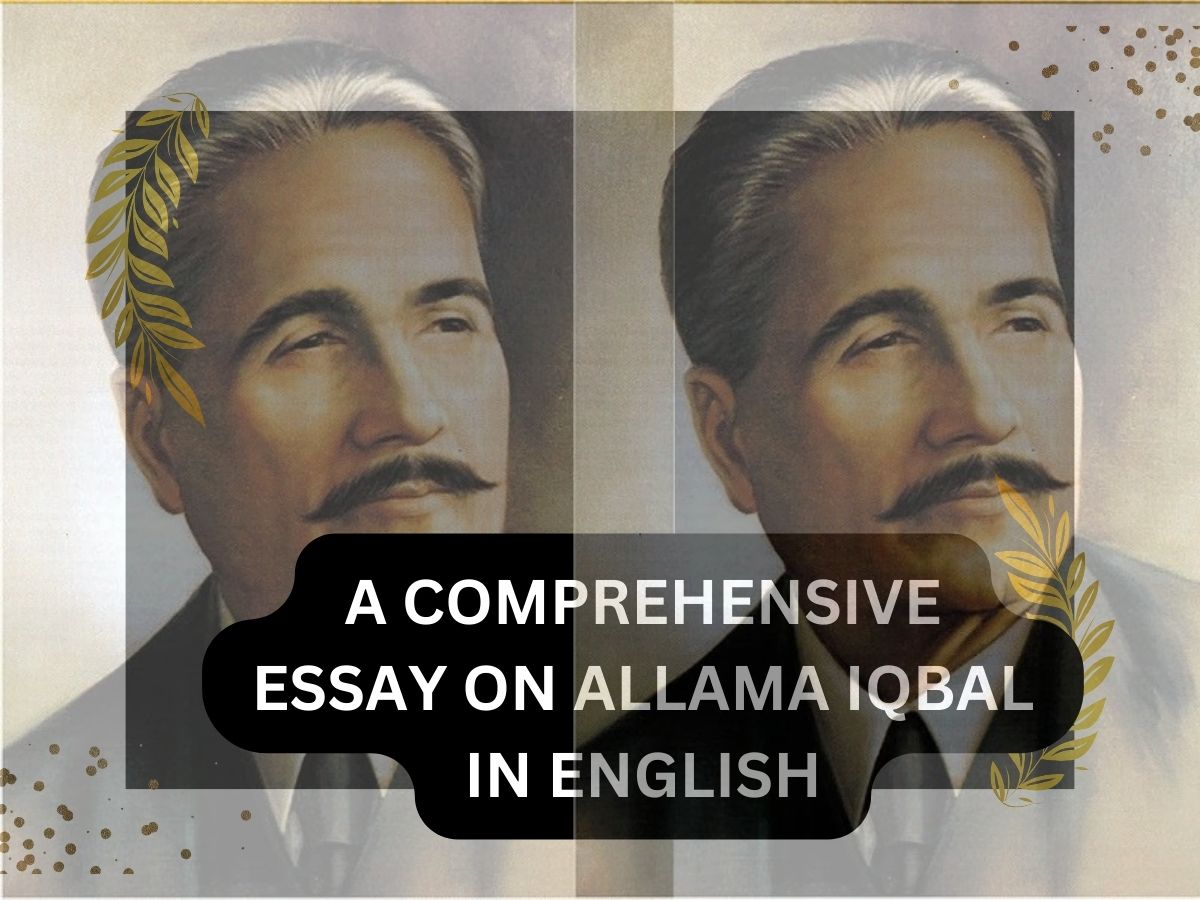
Introduction to Allama Muhammad Iqbal (Essay On Allama Iqbal ):
Allama Muhammad Iqbal , often called Allama Iqbal, was a famous poet, philosopher, and thinker from Pakistan. He was born on November 9, 1877, in Sialkot, which is a part of Pakistan. Iqbal’s ideas and work have had a big impact on the culture, thinking, and politics of the region.
Table of Contents
His date of death is April 21, 1938 (at the age 60 years), in Lahore Pakistan.
Let’s discuss his life below with wisdom and ambitions.
Early Life and Schooling
Iqbal grew up in a simple family and got his early education in Sialkot. He loved learning and went to Lahore for more schooling. He did very well there. Later, he went to Europe for higher studies and got degrees in philosophy and law from respected universities.
Writing and Thinking
Iqbal wrote poetry that is famous for its deep thoughts and beautiful words. He wrote in Urdu and Persian, talking about spiritual and deep ideas. His poems made people think about themselves, spirituality, and life’s meaning.
Apart from poetry, Iqbal wrote about his ideas for bringing new life to Islamic thinking and making Muslims stronger. He talked about important things like individuality, self-belief, and the role of religion in society. His words inspired many people.
Active in Politics
Iqbal didn’t just write poetry; he was also involved in politics. He strongly supported the rights of Muslims in British India and played a big role in the Pakistan Movement. This movement led to the creation of Pakistan in 1947. His speeches and writings gave strength and unity to Muslims.
The concept of Pakistan
The concept of Pakistan was presented by Allama Muhammad Iqbal, a renowned poet, philosopher, and political thinker. He first proposed the idea of a separate homeland for Muslims in his presidential address at the All-India Muslim League’s annual session in Allahabad in 1930. Iqbal’s vision laid the groundwork for the Lahore Resolution, which later led to the creation of Pakistan.
The concept of Shaheen in Allama Iqbal’s Philosophy:
In Allama Iqbal’s ideas, “Shaheen”(The eagle) is really important. It’s not just a bird; it means someone with big dreams and strong beliefs. Iqbal talks about the Shaheen like it’s a person who wants to be really smart and good. The Shaheen is like a symbol for people who keep trying to be better and never give up. It shows that everyone has the potential to do great things if they work hard and believe in themselves. Iqbal wants everyone to be like the Shaheen, always aiming high and never giving up on their dreams.
Iqbal’s Vision for Muslims
Iqbal believed in “Khudi,” which means selfhood. He wanted Muslims to be confident, creative, and morally strong. He wanted them to embrace their Islamic culture and be proud in the modern world.
Shayer-e-Mashriq:
Shayer-e-Mashriq, which means “Poet of the East,” is a title given to Allama Muhammad Iqbal, a famous poet, philosopher, and politician from British India who played a significant role in the intellectual and political landscape of South Asia during the early 20th century. Iqbal’s poetry often focused on themes of self-discovery, spirituality, and the revitalization of the Muslim community. His simple yet profound verses resonated deeply with people, inspiring them to strive for self-improvement and social change. Through his poetry, Iqbal urged Muslims to embrace their cultural heritage, seek knowledge, and work towards creating a more just and equitable society. His words continue to inspire millions around the world, transcending barriers of language and culture.
Influence and Legacy
Iqbal’s ideas still inspire people worldwide. In Pakistan, he is honored as the national poet and remembered for his part in the country’s independence. Beyond Pakistan, his thoughts have touched scholars, poets, and activists everywhere, shaping discussions on identity, spirituality, and fairness.
Some Famous Quotes by Allama Iqbal
“Be aware of your own worth, use all of your power to achieve it.” “The ultimate aim of the ego is not to see something, but to be something.” “The person who has no self-respect is like a corpse.” “Raise yourself to such heights that even the universe starts to admire you.” “The biggest sin is that you forget your own identity.” “A man who has no vision, he has no future.” “Nations are born in the hearts of poets, they prosper and die in the hands of politicians.” “Words, without power, are nothing but mere philosophy.” “Don’t be a slave to others when Allah has created you free.” “If you have nothing to say, don’t say anything. But if you have something to say, let it out boldly.”
To sum up, Allama Muhammad Iqbal was more than just a poet or philosopher; he was a thinker who sparked a movement for change. His poetry and ideas are still relevant today, guiding and inspiring people in a changing world.
Leave a Reply Cancel reply
Your email address will not be published. Required fields are marked *
Save my name, email, and website in this browser for the next time I comment.

Allama Iqbal Essay in English | علامہ اقبال پر مضمون
Today I write an allama iqbal essay in English with headings, pdf, and quotations for classes 3,6,4,5,7,8,9,1,2, and 10th in small, easy, and short wording. Allama Iqbal is one of the most prominent figures in Urdu literature and Pakistani history. Dr Allama Muhammad Iqbal was a renowned poet, mystic, philosopher, and political activist who was pivotal in the Pakistan Movement. In this my favourite personality allama iqbal essay, we will explore Allama Iqbal’s life, achievements, and legacy, highlighting his enduring impact on modern Pakistani society.
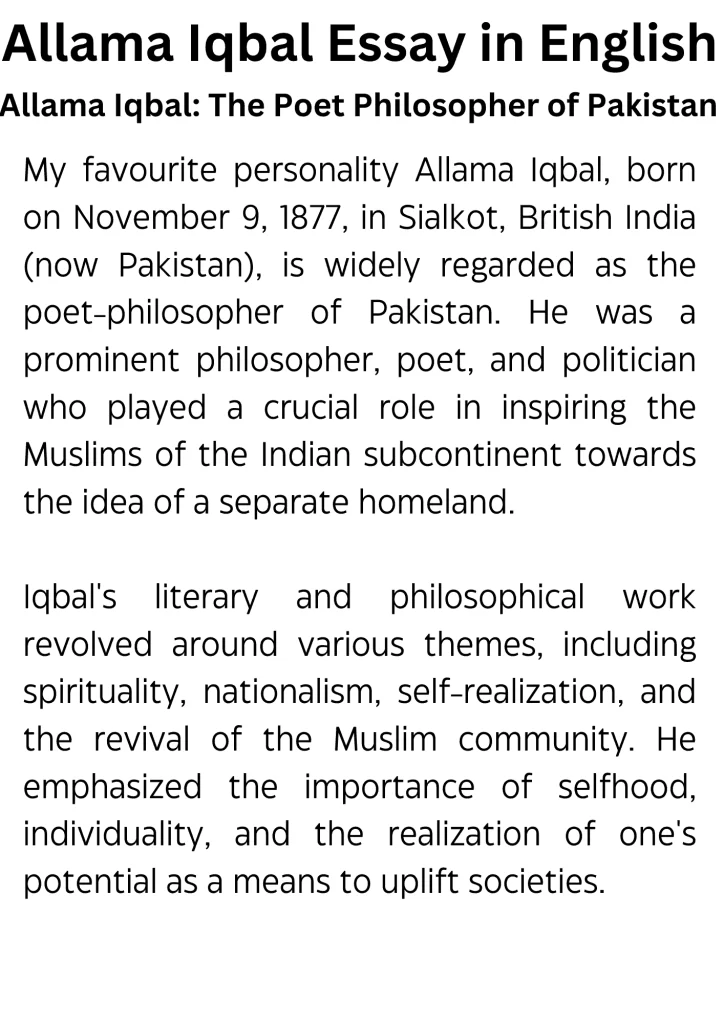
allama iqbal essay in english pdf free download
Essay on Allama Iqbal in English With Headings
Introduction allama iqbal and his significance.
Allama Iqbal, born on November 9, 1877, in Sialkot, British India (now Pakistan), was a renowned philosopher, poet, and politician. He is widely recognized as one of the most influential thinkers and leaders in the history of Pakistan and the Muslim world. Iqbal’s significance lies in his multifaceted contributions to literature, philosophy, and the political movement for the creation of Pakistan.
Early life and education of Allama Iqbal
He belonged to a Kashmiri Muslim family of scholars and religious leaders. His father, Sheikh Noor Muhammad, was a respected tailor and religious scholar. In 1895, Iqbal travelled to England to pursue higher studies. He enrolled at Trinity College, University of Cambridge, and obtained a Bachelor of Arts degree in 1897.
In 1905, Iqbal travelled to Germany to pursue a doctoral degree in philosophy. He studied at the Ludwig Maximilian University of Munich under the guidance of prominent scholars such as Friedrich Hommel and Friedrich Paulsen. In 1907, Iqbal completed his doctoral thesis titled “The Development of Metaphysics in Persia.”
Literary Works and Contributions to Urdu and Persian Poetry
- “Bang-e-Dra” (The Call of the Marching Bell): This collection, published in 1924, marks a significant milestone in Iqbal’s poetic journey.
- “Zarb-i Kalim” (The Reed’s Strike): Published in 1936, this collection further showcases Iqbal’s mastery of poetic expression.” Lab Pe Aati Hai Dua Ban Ke Tamanna Meri” (My Prayer Rises to My Lips as a Desire) and “Sitaron Se Aage Jahan Aur Bhi Hain” (Beyond the Stars.
- “Bal-e-Jibril” (Gabriel’s Wing): This collection, published in 1935, further showcases Iqbal’s poetic genius. Notable poems from this collection include “Gabriel’s Wing,” “Lenin in Islam,” and “Mard-e-Momin” (The Ideal Muslim).
- Persian Poetry: Iqbal’s Persian poetry holds immense significance and has garnered appreciation from scholars and poets worldwide. His Persian verses reflect his deep knowledge of Persian literature and philosophy.
Philosophical ideas and Concepts introduced by Allama Iqbal
- Khudi (Selfhood): Iqbal emphasized the concept of “Khudi” or selfhood as a central theme in his philosophical works.
- Tawheed (Unity of God): Iqbal explored the concept of Tawheed, emphasizing the unity of God and the interconnectedness of all existence.
- Iqbal’s Concept of God: Iqbal’s understanding of God is dynamic and evolving. He rejected a static and passive concept of God, advocating for an active and living God who actively engages with creation.
- Concept of Ijtehad: Iqbal emphasized the importance of “Ijtehad,” which refers to the independent interpretation of Islamic principles and laws in response to changing circumstances.
- Reconstruction of Muslim Ummah: Iqbal was deeply concerned about the decline of the Muslim community and called for its intellectual and spiritual rejuvenation.
Legacy and Impact of Allama Iqbal on Pakistan and the World
- Ideological Foundation of Pakistan: Allama Iqbal’s vision and intellectual contributions played a pivotal role in inspiring the demand for a separate homeland for Muslims, leading to the creation of Pakistan in 1947.
- National Poet and Literary Icon : Allama Iqbal is Pakistan’s national poet. His poetic works in Urdu and Persian continue to be widely read, celebrated and studied.
- Educational Reforms: Allama Iqbal emphasized the importance of education as a means of empowerment and social progress.
- International Recognition: Allama Iqbal’s impact extends beyond Pakistan’s borders. His poetry and philosophical ideas have gained recognition and appreciation worldwide.
My Favourite Personality Iqbal Essay Poetry in English – شاعری
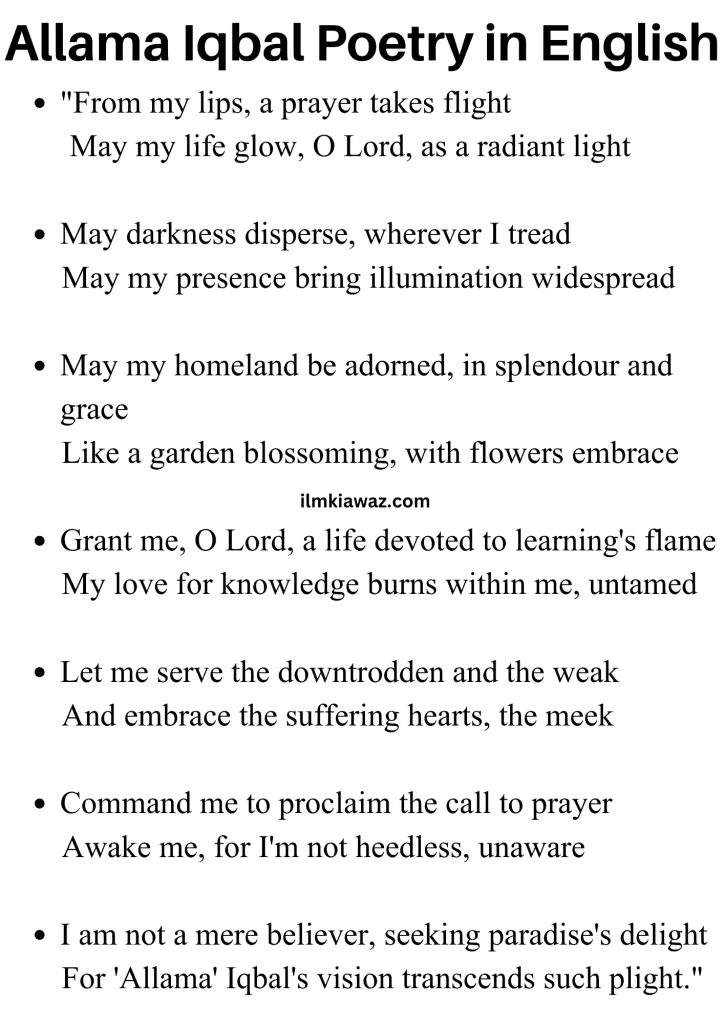
10 lines on Allama Iqbal Essay in English
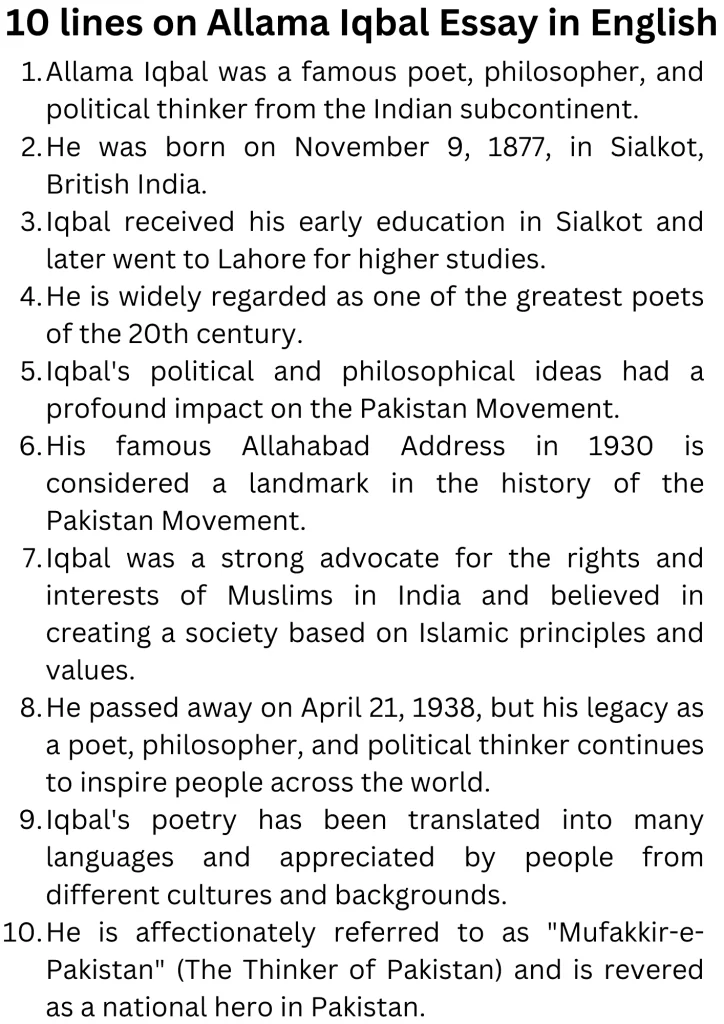
Allama Iqbal was a visionary leader who made an indelible impact on the history of Pakistan and the globe. His poetry and ideas continue to inspire and drive others to this day. His philosophy of self-reliance, tenacity, and compassion for everyone has become a cornerstone of Pakistani society, and his legacy will be remembered for years.
Who was allama iqbal?
Allama Muhammad Iqbal was a prominent poet, philosopher, and politician of the 20th century, widely regarded as the national poet of Pakistan. He is known for his poetry which reflects his deep understanding of Islamic spirituality, philosophy, and culture.
When was he formally titled Sir?
Allama Muhammad Iqbal was formally titled “Sir” in 1922 when the British government awarded him a knighthood in recognition of his services as a scholar and a poet.
What was Allama Iqbal’s contribution to literature?
A: Allama Iqbal’s contribution to literature was immense. He wrote poetry in both Urdu and Persian, which is characterized by rich metaphors, deep symbolism, and a profound understanding of Islamic spirituality.
What was Allama Iqbal’s political philosophy?
A: Allama Iqbal’s political philosophy was based on the idea of an independent Muslim state. He played a key role in the struggle for the creation of Pakistan and his vision of a separate Muslim state inspired the Muslim community of India.
What is Allama Iqbal’s legacy?
A: Allama Iqbal’s legacy is that of a poet, philosopher, and political thinker who has had a profound impact on Islamic thought. His poetry and philosophy continue to inspire people in Pakistan and around the world.
Allama Iqbal Born and Death date?
Allama Iqbal, whose full name was Sir Muhammad Iqbal, was born on November 9, 1877, in Sialkot, Punjab, British India (now Pakistan). He passed away on April 21, 1938, in Lahore, Punjab, British India (now Pakistan).
Note : I hope you enjoy reading this short, small, and easy essay on Allama Iqbal in the English language for classes 3,6,4,5,7,8,9, and others. you can also read
Ilm ki ahmiyat essay in urdu
Allama Iqbal essay in Urdu
Eid ul Adha Essay in Urdu
Leave a Comment Cancel reply
Save my name, email, and website in this browser for the next time I comment.

25,000+ students realised their study abroad dream with us. Take the first step today
Meet top uk universities from the comfort of your home, here’s your new year gift, one app for all your, study abroad needs, start your journey, track your progress, grow with the community and so much more.

Verification Code
An OTP has been sent to your registered mobile no. Please verify

Thanks for your comment !
Our team will review it before it's shown to our readers.

- School Education /
Essay on Allama Iqbal in 450 Words
- Updated on
- Sep 16, 2023

The real name of Allama Iqbal was Mohammad Iqbal. He was born on November 9, in the year 1877, in Sialkot, Punjab. Iqbal belonged to a Kashmiri Brahmin family that embraced Islam in the seventeenth century. After receiving his traditional education in Arabic, Persian, and Urdu, he turned to liberal education which helped in encouraging his interest in poetry in his life. He started his educational career at the Scottish Mission School and he went on to acquire his degree in M.A. Philosophy. After that, he joined the Trinity College. Further, he got his degree of doctorate from the University of Munich, Germany by working on his thesis ‘The Development of Metaphysics’ in Persia. Continue reading the essay on Allama Iqbal to know more about his life.

Table of Contents
- 1 Essay on Allama Iqbal in 450 Words
- 2 Philosophical Position and Influence of Muhammad Iqbal
- 3 Popular Works of Allama Iqbal
Also Read: Allama Iqbal Shayari on Life, love, and Inspiration
Allama Iqbal is known for his influential efforts in directing his fellow Muslims in British-administered India toward the idea of establishment of a separate Muslim State. This aspiration was eventually realized during The Partition of 1947.
After completing his education and returning from Europe, he gained his bread and butter via practicing Law, but the fame he acquired was from his Persian and Urdu-language poetry, which he wrote in a classical style to make it easy for the public to recite. His poetry became widely known through poetic synopsis and in a milieu in which memorizing verse was customary.
Also Read: Essay on Mahatma Gandhi
Philosophical Position and Influence of Muhammad Iqbal
In The Reconstruction of Religious Thought in Islam (1934) his philosophical position was articulated. This was a volume based on six lectures delivered at Madras and Aligarh in 1928-29. He argued that a man who is rightly focused should generate vitality unceasingly through his interaction with the purposes of the living god.
Allama Iqbal had returned from his unitary experience of god to let loose on Earth a new type of Cultural World and manhood through the abolition of priesthood and hereditary kingship and by emphasis on the study of Nature and History. Iqbal also promoted and advocated the theory of ijma i.e. consensus.
During the time he was delivering lectures, he began working with the Muslim League. In the year 1930, at the annual session of the league at Allahabad, Iqbal gave the presidential address and made a statement that the Muslims of North-Western India should demand status as a separate state.
Popular Works of Allama Iqbal
There were 3 significant poems written by him namely, Shikwah (The Compliant), Jawab-e Shikwah (The Answer to the Compliant), and Khizr-e rah (Khizr, The Guide) which were published later in the year 1924 in the Urdu collection Bang-e rah (The Call of the Bell). In these poems, via his words, Iqbal gave an intense expression to the anguish of the Muslim powerlessness.
Although Iqbal was in favor of the creation of Pakistan and is known as the Nation’s National poet, he wrote a famous patriotic song in the year 1905 that celebrates the Greatness of India. A song that is recited by every Indian and proudly puts forth feelings of love and loyalty towards India, the song is ‘Saare Jahaan Se Achha‘ which is also known as ‘Tarana-e Hind’.
The year 1923 saw King George V bestow a knighthood upon Allama Iqbal, who went on to be known as “Sir Mohammad Iqbal” from that point forward.
Allama Iqbal is regarded as a poet-philosopher of the East who addressed the Muslim ummah and believed in the Wahdatul wujood. He wrote in both, Persian as well as Urdu.
His poetry emerged as an amazing site where art and message converged to deliver his individual vision. He used to include a lot of poetic devices such as myth, metaphors, symbols, etc. Some of his works that are widely recognized include a collection of poems namely, Rumooz-e Bekhudi, Baal-e Jibreel, Zaboor-e ‘Ajm, Javed Naama, Payaam-e Mashriq, etc.
Allama Iqbal died on April 21, 1938, in Lahore, Punjab. He has been acclaimed as the father of Pakistan and hence, Iqbal Day is celebrated in Pakistan on November 9. Sir Muhammad Iqbal was a Pakistani Poet-Philosopher and is known as the National Poet of Pakistan. He has been acclaimed as the father of Pakistan and hence, Iqbal Day is celebrated in Pakistan on November 9.
Also Read:- The Evergreen Shayari of Gulzar
Ans: Sir Muhammad Iqbal wrote a famous patriotic song in the year 1905 that celebrates the Greatness of India. A song that is recited by every Indian and proudly puts forth feelings of love and loyalty towards India, that song is ‘Saare Jahaan Se Achha‘ which is also known as ‘Tarana-e Hind’
Ans: Allama Iqbal is known for his influential efforts in directing his fellow Muslims in British-administered India toward the idea of establishment of a separate Muslim State. This aspiration was eventually realized during The Partition of 1947.
Ans: Muhammad Iqbal is frequently referred to as Allama Iqbal, where Allama is an Urdu word for ‘Scholar’. He was a renowned scholar and was famous for his Urdu poetry
We hope this blog on Allama Iqbal helped you gain knowledge about him. Follow Leverage Edu for more interesting articles and topics on essay writing .
Deepansh Gautam
Leave a Reply Cancel reply
Save my name, email, and website in this browser for the next time I comment.
Contact no. *

Connect With Us

25,000+ students realised their study abroad dream with us. Take the first step today.

Resend OTP in

Need help with?
Study abroad.
UK, Canada, US & More
IELTS, GRE, GMAT & More
Scholarship, Loans & Forex
Country Preference
New Zealand
Which English test are you planning to take?
Which academic test are you planning to take.
Not Sure yet
When are you planning to take the exam?
Already booked my exam slot
Within 2 Months
Want to learn about the test
Which Degree do you wish to pursue?
When do you want to start studying abroad.
January 2024
September 2024
What is your budget to study abroad?

How would you describe this article ?
Please rate this article
We would like to hear more.
Have something on your mind?

Make your study abroad dream a reality in January 2022 with
India's Biggest Virtual University Fair

Essex Direct Admission Day
Why attend .

Don't Miss Out

- Registration
- Roll No Slips
- Duplicate Bill
- Tips & Guide
Essay on Allama Muhammad Iqbal in English
The architect of the ideology of Pakistan Doctor Allama Iqbal is, undoubtedly, the great Islamic thinker of the modern times and one of the greatest of all time. He is a great poet, philosopher, educationist, and reformer. He had made a lasting contribution to Human thought. His poetic works made him immortal. Essay on Allama Muhammad Iqbal in English with Quotations. Allama Iqbal was the great poet-philosopher and active political leader born at Sialkot, Punjab, in 1877. He descended from a family of Kashmiri Brahmans, who had embraced Islam about 300 years earlier.
Allama Iqbal received his early education in the traditional Madrassa. Later he joined the Sialkot Mission School, from where he passed his matriculate examination. In 1897, he obtained his Bachelor of Arts Degree from Government College, Lahore. After Two years , he secured his Masters Degree and was appointed in the Oriental College, Lahore, as a lecturer of history, philosophy and English. He later proceeded to Europe for higher studies. Having obtained a degree from Cambridge, he secured his doctorate at Munich and finally qualified as a lawyer.
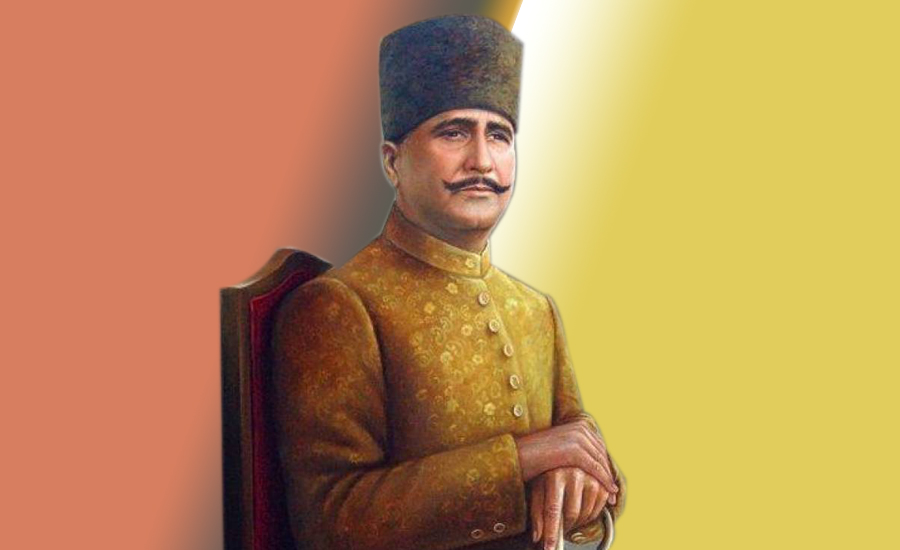
He returned to India in 1908. Besides teaching and practicing law, Iqbal continued to write poetry. He resigned from government service in 1911 and took up the task of propagating individual thinking among the Muslims through poetry. When the Hindu philosophers presented this philosophy that a nation is born throughout the country and when Maulana Hussam Ahmed Madni seconded it then Iqbal reacted strongly towards it.
Allama Iqbal his debut in politics then he was elected as the member of Punjab’s legislative assembly in 1926, during the elections of 1937 when Quaid-e-Azam started re contructioning of the Muslim League Allama Iqbal was along with him.
Allama Iqbal believe that the Muslims of India have a separate identity and to protect his identity the establishment of a separate homeland for the Muslims of india was necessary. On 28 March 1909 he excusing the invitation from the secular party “Minsva Lodge” said I have been a keen supporter of this theory that religious differences in the country should end and even now I practice the principle. During 1930-32 three sessions of Round Table Conference were held. Iqbal attended second and third round table conference. Having attended the second round table conference in September 1931 in London, he was keenly aware of the deep seated Hindu and Sikh prejudice and unaccommodating attitude.
Iqbal also acted as the Right hand of Muhammad Ali Jinnah. Iqbal also worked for the prosperity of Muslims. But He could not see his dream becoming a reality and died on 21st April 1938. His Tomb is near the main gate of Badshahi Mosque.He gave the message of Love, brotherhood, hope, and self-awareness. His message will remain forever. May his soul rest in peace.
Related Study Posts:
- Allama Iqbal Medical College AIMC Merit List 2024…
- My Best Friend Essay in English
- Essay on Bright Future of Pakistan in English
- Essay Quaid-e-Azam Mohammad Ali Jinnah in English
- Dost Muhammad Mazari Election Result 2024 Check Online
- Essay on Corruption in Pakistan Its Causes
- Essay on Pollution in Pakistan and Its Causes
- Essay Why I Love Pakistan With Outline
- Essay on Terrorism in Pakistan Causes Effects and Solution
- Education Should Be Free Essay Long and Short
You May Also Like
Cover letter for jobs application, how to write resignation letter for jobs format sample, national jobs portal 2024 create account @ www.njp.gov.pk, scope salary of environmental sciences in pakistan jobs, ntdc salary slip 2024 registration online pay slip, hrsg pay slip 2024 download online by name & cnic no.
About the Author: Mustansar Khan
Leave a reply cancel reply.
Your email address will not be published. Required fields are marked *
- X (Twitter)
Essay on Allama Iqbal

Allama Iqbal is one of the most influential Muslim thinkers. Allama Iqbal was one of the greatest philosophers, and poets as well as an active political leader. His poetry is quite famous and had a great impact on Pakistan’s freedom movement. Mohammad Iqbal was born on the 9th of November 1877, in the city of Sialkot. He was born into a Kashmiri family that migrated from Afghanistan during British rule . His name was Allama which meant scholar. Allama Iqbal grew up in a very religious family. Allama Iqbal was a bright intelligent student, his education began at a traditional Madrassa and later he joined the Sialkot Mission School where he passed his Matriculation exams.
Throughout his career, Allama Iqbal followed various professions but at different times. He is held in high regard in Pakistan as well as India and among the Muslims of South Asia. Allama Iqbal worked as a professor of philosophy, took part in politics, practiced law, and even joined the round table conference. Years later, Allama Iqbal became a national poet, and he favored the idea of Pakistan.
Allama Iqbal had command over many languages. Such as Persian, Arabic, and Urdu. He not only wrote masterpieces in Urdu but in Persian as well. His poetry is quite famous and has even received international acclaim, while many people have even criticized upon his work. Some people believe him to be a political poet.
Allama Iqbal was among the very few people who raised his voice for the Muslims residing in India who were under British rule, he even brought the social problems into the light and addressed them. It was due to his outstanding poetry that many Muslims were influenced in 1930 to brainstorm the idea of a separate homeland for Muslims.
Allama Iqbal has written many books. Some of the most famous ones are The Secrets of the Self, Shikwa and Jawab-e-Shikwa, The Call of the Marching Bell, Zarb-i-Kalim, and many more. His amazing piece of poetry is still appreciated by many people. Allama Iqbal died in 1938 on the 21st of April. He is buried in Lahore.
Some of Allama Iqbal’s famous quotes are as follows:
“The ultimate aim of the ego is not to see something, but to be something.”
“Vision without power does bring moral elevation but cannot give a lasting culture.”
“Words without power, are mere philosophy.”
“Man is primarily governed by passion and instinct.”
“Failure is not fatal until we surrender trying again is the key to glorious victory.”

Other than Essay on Allama Iqbal, you can also read Essay on Quaid e Azam
These might interest you.
Related Posts
Best essay on quaid e azam, ca pakistan general information, css exam in pakistan general information.
Based on 3 rating(s)
Recommended by 03 reviewer(s)
Student Experience
Campus infrastrucure, by 03 reviewer(s).
Farhat Qamar
Nicely written thanks for this informative essay 👍♥️
Raheel Ahmed
Nicely written, we need to highlight more on Allama Iqbal, and the youth should be informed more about the Legend
Muhammad Usman
May Allah make everyone successful
Leave feedback about this Cancel reply
Your email address will not be published.
Recommendation:
Notify me of follow-up comments by email.
Notify me of new posts by email.
- CAREER GUIDES
- University Reviews
- Scholarships
- Educational Profiles
- Special Post

Short Essay: Allama Iqbal
A couple of short essay examples on Allama Iqbal.
Table of Contents
Allama Iqbal Essay Example 1
Allama Iqbal was a renowned philosopher, poet, and political leader who played a pivotal role in the independence movement of Pakistan. He is widely regarded as the spiritual father of the country and is remembered for his contributions towards the betterment of the Muslim community. His poetry and philosophy continue to inspire people to this day, and his teachings remain relevant in contemporary times. In this essay, we will explore the life and works of Allama Iqbal, his contribution towards the independence movement, and his philosophy of self-realization and Muslim unity.
Allama Iqbal was born in Sialkot, Punjab, in 1877. He received his early education in his hometown and later went on to study in Lahore and Cambridge. He was a brilliant student and excelled in academics. Iqbal was deeply influenced by Western philosophy and literature, and his works reflect the fusion of the Eastern and Western intellectual traditions. He was a prolific writer and wrote in both Urdu and Persian. Some of his most famous works include “Asrar-i-Khudi,” “Bang-i-Dra,” and “Zarb-i-Kalim.” Iqbal’s poetry was characterized by its philosophical depth, emotional intensity, and lyrical quality. His poems were not only aesthetically pleasing but also conveyed profound ideas and messages.
Allama Iqbal was a staunch advocate of Muslim unity and played a key role in the independence movement of Pakistan. He believed that the Muslims of the subcontinent needed to unite and assert themselves in the face of colonialism and oppression. Iqbal was a member of the All India Muslim League and served as its president in 1930. He was instrumental in formulating the idea of a separate Muslim state, which eventually led to the creation of Pakistan in 1947. Iqbal’s vision of a separate Muslim state was based on the idea of creating a society that was based on Islamic principles and values, where Muslims could live freely and prosperously.
Iqbal’s philosophy emphasized the importance of self-realization and the need for Muslims to assert themselves. He believed that Muslims needed to be self-aware and strive for excellence in every aspect of their lives. Iqbal’s concept of “khudi” or selfhood emphasized the importance of individuality and self-expression. He believed that every individual had the potential to achieve greatness and that it was the duty of every Muslim to realize their full potential. Iqbal’s philosophy was not only relevant in the context of the independence movement but also holds relevance in contemporary times. His ideas of self-realization and Muslim unity continue to inspire people to this day.
Allama Iqbal was a towering figure in the intellectual and political landscape of the subcontinent. His contributions towards the independence movement and his philosophy of self-realization and Muslim unity continue to inspire people to this day. Iqbal’s works reflect the fusion of the Eastern and Western intellectual traditions and convey profound ideas and messages. He was a true visionary who believed in the power of the individual to effect change in society. His legacy continues to shape the cultural and intellectual landscape of Pakistan and the wider Muslim world.
Allama Iqbal Essay Example 2
Allama Iqbal is one of the most celebrated figures in the history of Pakistan. He was a poet, philosopher, and politician who played a significant role in the creation of Pakistan. His poetry celebrates the spiritual and cultural heritage of the Muslim world, and his ideas have had a profound impact on the development of Pakistan as a nation. This essay will explore the life and achievements of Allama Iqbal, with a focus on his poetry, his role in the creation of Pakistan, and his lasting legacy.
Allama Iqbal was a remarkable poet whose work celebrates the spiritual and cultural heritage of the Muslim world. His poetry is characterized by its beauty, depth, and complexity, and it has been translated into many languages around the world. Iqbal’s poetry is infused with a deep sense of spirituality, and it reflects his belief in the unity of God and the oneness of humanity. His most famous work is the poem “Shikwa,” which expresses his frustration with the decline of the Muslim world and his desire to see it restored to its former glory.
Allama Iqbal played a crucial role in the creation of Pakistan, and he is considered one of the most important figures in the country’s history. He was a passionate advocate for Muslim rights and was instrumental in the movement for Indian Muslims to have their own separate state. Iqbal’s famous speech at the Allahabad session of the All India Muslim League in 1930 is widely regarded as a pivotal moment in the struggle for independence. It was here that he first proposed the idea of a separate Muslim state in India, which eventually led to the creation of Pakistan in 1947.
Allama Iqbal’s legacy is still felt in Pakistan today. He is widely recognized as a national hero and a symbol of Pakistani identity. His ideas about the importance of Muslim unity and the need for a separate Muslim state in India continue to shape the country’s political and cultural landscape. Iqbal’s poetry is still read and celebrated, and his ideas about the relationship between Islam and modernity continue to be debated and discussed. In short, Allama Iqbal’s contributions to Pakistan’s history and culture are immeasurable, and his legacy will continue to inspire generations to come.
Allama Iqbal was a remarkable figure whose poetry, philosophy, and political activism have had a profound impact on the history and culture of Pakistan. His work celebrates the spiritual and cultural heritage of the Muslim world, and his ideas about Muslim unity and the need for a separate Muslim state in India were instrumental in the creation of Pakistan. Allama Iqbal’s legacy is still felt in Pakistan today, and his contributions to the country’s history and culture will continue to inspire generations to come.
Allama Iqbal Essay Example 3
Allama Iqbal is a household name in Pakistan, known for his contributions to philosophy, poetry, and politics. He is widely regarded as the spiritual father of Pakistan, having played an instrumental role in the country’s creation. Iqbal’s poetry continues to inspire generations of Pakistanis, with themes that include spirituality, self-discovery, and the struggles of the Muslim community. This essay will explore the life and legacy of Allama Iqbal, focusing on three key aspects of his contributions to Pakistani culture and politics.
Allama Iqbal was a philosopher, poet, and politician who played a key role in the creation of Pakistan. Born in Sialkot, Punjab, in 1877, Iqbal completed his education in Lahore before traveling to Europe to pursue further studies. It was during this time that he developed his interest in philosophy, particularly the works of Friedrich Nietzsche, Henri Bergson, and Ibn Arabi. Iqbal’s poetry reflects his philosophical ideas, with a focus on themes such as self-discovery, spirituality, and the relationship between the individual and society. Iqbal’s political career began in the early 1920s when he was elected to the Punjab Legislative Council. He went on to become a member of the All India Muslim League, which advocated for the creation of a separate Muslim state in India. Iqbal’s vision for Pakistan was based on the idea of a separate homeland for Muslims, where they could practice their religion and culture freely.
Iqbal’s poetry focused on themes such as spirituality, self-discovery, and the struggles of the Muslim community. His most famous works include ‘Asrar-e-Khudi’ (Secrets of the Self), ‘Bang-i-Dra’ (The Call of the Marching Bell), and ‘Zarb-i-Kalim’ (The Reed’s Pen). These works explore the concept of self-realization, with Iqbal urging his readers to discover their own inner strength and potential. Iqbal’s poetry also reflects his concern for the Muslim community, which he saw as facing many challenges in India. He wrote about the need for Muslims to unite and work towards creating a separate homeland, where they could live according to their own traditions and beliefs.
Allama Iqbal’s ideas and writings continue to be influential in Pakistani culture and politics. His vision for Pakistan as a separate homeland for Muslims was realized in 1947, when India was partitioned into two nations. Iqbal’s legacy as a philosopher and poet is also evident in the continued popularity of his works in Pakistan. His poetry is often recited at cultural events, and his ideas continue to inspire generations of Pakistanis. Iqbal’s political legacy is also significant, with his vision for Pakistan serving as a guiding principle for many political parties and movements. In recent years, there has been renewed interest in Iqbal’s ideas, particularly his emphasis on self-realization and individual freedom.
In conclusion, Allama Iqbal was a philosopher, poet, and politician who played a key role in the creation of Pakistan. His poetry focused on themes such as spirituality, self-discovery, and the struggles of the Muslim community, and his ideas continue to be influential in Pakistani culture and politics. Iqbal’s legacy as a thinker and writer is evident in the continued popularity of his works in Pakistan, and his vision for Pakistan as a separate homeland for Muslims has been realized. Allama Iqbal remains an important figure in Pakistan’s history and culture, and his ideas continue to inspire generations of Pakistanis.
About Mr. Greg
Mr. Greg is an English teacher from Edinburgh, Scotland, currently based in Hong Kong. He has over 5 years teaching experience and recently completed his PGCE at the University of Essex Online. In 2013, he graduated from Edinburgh Napier University with a BEng(Hons) in Computing, with a focus on social media.
Mr. Greg’s English Cloud was created in 2020 during the pandemic, aiming to provide students and parents with resources to help facilitate their learning at home.
Whatsapp: +85259609792
[email protected]


Essay On Allama Iqbal
This essay delves into the life, contributions, and legacy of Allama Iqbal , a renowned poet, philosopher, and political leader pivotal in the establishment of Pakistan. It encompasses an exploration of his life events, literary works, visionary perspectives, and lasting impact. The essay sheds light on his crucial role in fostering Muslim unity and advocating for a distinct homeland for the Muslims of the Indian subcontinent. Additionally, it delves into the profound philosophical and spiritual themes embedded in Allama Iqbal’s poetry . Notably, Allama Iqbal was born on November 9, 1877, and he departed from this world on April 21, 1938.
Essay On Allama Iqbal 100 Words
Allama Iqbal, born on November 9, 1877, in Sialkot, Punjab, British India, earned renown as a poet, philosopher, and political thinker, playing a pivotal role in the independence movement of Pakistan.
A strong proponent of Muslim unity, Iqbal underscored the necessity for a distinct homeland for the Muslims of the subcontinent. His extensive writings delved into Islamic philosophy, spirituality, and nationalism.
His poetry stands out for its profound philosophical insights and spiritual depth, with notable works including “Asrar-e-Khudi,” “Zarb-i-Kalim,” and “Bang-i-Dra.” The widely recited poem “Lab Pe Aati Hai Dua Ban Ke Tamanna Meri” is particularly famous in schools and gatherings across Pakistan.
Allama Iqbal’s visionary outlook anticipated the challenges confronting the Muslim world, and he advocated for their elevation through education and intellectual empowerment. His passing on April 21, 1938, in Lahore marked the end of a life dedicated to leaving behind a lasting legacy of poetry, philosophy, and political thought.
Allama Iqbal essay in English for class 1
Allama Iqbal, a distinguished poet and intellectual figure in Pakistan, came into the world on 9th November 1877 in Sialkot, a city situated in Punjab. Proficient in both Urdu and Persian languages, he earned the title of the “Poet of the East.”
Deeply devoted to his country and religion, Allama Iqbal ardently desired a separate homeland for the Muslims of India. This vision took shape during his renowned speech in Allahabad in 1930, where he proposed the idea of Pakistan. His vision emphasized the creation of a distinct state for Muslims to uphold their unique culture and values.
In addition to his poetic pursuits, Allama Iqbal was a learned scholar and philosopher. Having pursued education in various countries, including England and Germany, he authored numerous books on Islamic philosophy and history. His lectures on the reconstruction of religious thought in Islam aimed at fortifying Muslims and fostering self-reliance.
Allama Iqbal breathed his last on 21st April 1938 in Lahore, where he found his final resting place near the Badshahi Mosque. His tomb draws many admirers who pay homage to his legacy. Recognized as the national poet of Pakistan, Iqbal’s birthday is commemorated annually as Iqbal Day, serving as a perennial source of inspiration for all Pakistanis.
Essay on Allama Iqbal in Urdu for class 2
علامہ اقبال پاکستان کے عظیم شاعر اور رہنما تھے۔ وہ 9 نومبر 1877 کو سیالکوٹ میں پیدا ہوئے، ان کے والد کا نام شیخ نور محمد اور والدہ کا نام امام بی بی تھا۔ اس کے دو بھائی اور ایک بہن تھی۔
علامہ اقبال کو بچپن ہی سے لکھنے پڑھنے کا شوق تھا۔ انہوں نے اردو، فارسی، عربی اور انگریزی زبانیں سیکھیں۔ انہوں نے اردو اور فارسی میں خوبصورت نظمیں لکھیں۔ انہیں شاعر مشرق بھی کہا جاتا ہے۔
علامہ اقبال چاہتے تھے کہ ہندوستان کے مسلمان انگریزوں کے تسلط سے آزاد ہوں۔ انہوں نے 1930 میں الہ آباد میں اپنی مشہور تقریر میں پاکستان کا نظریہ دیا، انہوں نے کہا کہ مسلمانوں کا ایک الگ ملک ہونا چاہیے جہاں وہ اسلام کے مطابق زندگی گزار سکیں۔
علامہ اقبال بھی ایک عقلمند اور بہادر رہنما تھے۔ انہوں نے مسلم لیگ میں شمولیت اختیار کی اور قیام پاکستان کے لیے قائد اعظم محمد علی جناح کے ساتھ کام کیا۔ انہوں نے قائداعظم کو خطوط بھی لکھے اور مشورہ بھی دیا۔
علامہ اقبال کا انتقال 21 اپریل 1938 کو لاہور میں ہوا۔ وہ بادشاہی مسجد کے قریب دفن ہیں۔ ان کا مقبرہ ایک خوبصورت جگہ ہے جہاں بہت سے لوگ آتے ہیں اور احترام کرتے ہیں۔ وہ پاکستان کے قومی شاعر ہیں اور ان کا یوم پیدائش ہر سال یوم اقبال کے طور پر منایا جاتا ہے۔ ہمیں علامہ اقبال اور پاکستان کے لیے ان کی خدمات پر فخر ہے۔
Allama Iqbal Essay in Urdu for class 3
علامہ اقبال پاکستان کے مشہور شاعر، فلسفی اور رہنما تھے۔ وہ 9 نومبر 1877 کو سیالکوٹ میں پیدا ہوئے۔ ان کے والد شیخ نور محمد اور والدہ کا نام امام بی بی تھا۔ اس کا ایک بھائی اور ایک بہن تھی۔
علامہ اقبال بہت ذہین اور محنتی تھے۔ انہوں نے اردو، فارسی، عربی اور انگریزی زبانوں کا مطالعہ کیا۔ انہوں نے اردو اور فارسی میں نظمیں لکھیں جو بہت خوبصورت اور معنی خیز ہیں۔ انہیں مشرق کا شاعر بھی کہا جاتا ہے۔
علامہ اقبال چاہتے تھے کہ ہندوستان کے مسلمان انگریزوں کے تسلط سے آزاد ہوں۔ انہوں نے 1930 میں الہ آباد میں اپنی تقریر میں پاکستان کا نظریہ دیا، انہوں نے کہا کہ مسلمانوں کا ایک الگ ملک ہونا چاہیے جہاں وہ اسلام کے مطابق زندگی گزار سکیں۔
علامہ اقبال بھی ایک بہادر اور دیانتدار رہنما تھے۔ انہوں نے مسلم لیگ میں شمولیت اختیار کی اور قیام پاکستان کے لیے قائد اعظم محمد علی جناح کے ساتھ کام کیا۔ انہوں نے قائداعظم کو خطوط بھی لکھے اور مشورہ بھی دیا۔
علامہ اقبال کا انتقال 21 اپریل 1938 کو لاہور میں ہوا۔ وہ بادشاہی مسجد کے قریب دفن ہیں۔ ان کا مقبرہ ایک خوبصورت جگہ ہے جہاں بہت سے لوگ آتے ہیں اور احترام کرتے ہیں۔ وہ پاکستان کے قومی شاعر ہیں اور ان کا یوم پیدائش ہر سال یوم اقبال کے طور پر منایا جاتا ہے۔ ہمیں علامہ اقبال اور ان کی شاعری سے پیار ہے۔
Allama Iqbal essay class 4
Allama Iqbal, a distinguished poet, philosopher, and statesman of Pakistan, entered the world in Sialkot on 9th November 1877. Born to Sheikh Noor Muhammad and Imam Bibi, he had a brother named Sheikh Ata Muhammad and a sister named Fatima Jinnah.
Demonstrating remarkable talent and diligence, Allama Iqbal immersed himself in the study of Urdu, Persian, Arabic, and English languages. His poetic prowess extended to both Urdu and Persian, earning him the title of the “Poet of the East.”
Driven by a desire for the freedom of Muslims in India from British rule, Allama Iqbal proposed the concept of Pakistan during his 1930 speech in Allahabad. He envisioned a separate nation where Muslims could live in accordance with the principles of Islam.
In addition to his role as a visionary poet, Allama Iqbal displayed courage and integrity as a leader. Aligning with the Muslim League, he collaborated with Quaid-e-Azam Muhammad Ali Jinnah in the endeavor to establish Pakistan. His letters to Quaid-e-Azam served as insightful advice during this crucial period.
Allama Iqbal departed from this world on 21st April 1938 in Lahore, finding his final resting place near the Badshahi Mosque. His tomb, a serene and revered site, attracts numerous visitors paying homage. Recognized as the national poet of Pakistan, his birthday is commemorated annually as Iqbal Day, a testament to the enduring love and admiration for Allama Iqbal and his timeless poetry.
Essay on Allama Iqbal in English for class 5
Allama Iqbal, a renowned poet, philosopher, and statesman of Pakistan, was born in Sialkot on 9th November 1877. His parents were Sheikh Noor Muhammad and Imam Bibi, and he had a brother named Sheikh Ata Muhammad and a sister named Fatima Jinnah.
Allama Iqbal’s exceptional talent and diligence were evident in his mastery of Urdu, Persian, Arabic, and English languages. His poems in both Urdu and Persian gained widespread acclaim, earning him the epithet “Poet of the East.”
Driven by a fervent desire for the freedom of Muslims in India from British rule, Allama Iqbal presented the concept of Pakistan during his 1930 speech in Allahabad. He envisioned a separate nation where Muslims could live in accordance with Islamic principles.
In addition to his role as a visionary poet, Allama Iqbal displayed courage and integrity as a leader. Aligning with the Muslim League, he collaborated with Quaid-e-Azam Muhammad Ali Jinnah in the efforts toward the creation of Pakistan. His letters to Quaid-e-Azam offered valuable advice during this critical period.
Allama Iqbal passed away on 21st April 1938 in Lahore and found his final resting place near the Badshahi Mosque. His tomb, a serene and revered location, attracts numerous visitors who come to pay their respects. Recognized as the national poet of Pakistan, his birthday is celebrated annually as Iqbal Day, a testament to the enduring love and admiration for Allama Iqbal and his timeless poetry.
Allama Iqbal essay in English for class 6
Allama Iqbal, a renowned poet, philosopher, and statesman of Pakistan, entered the world in Sialkot on 9th November 1877. His parents were Sheikh Noor Muhammad and Imam Bibi, and he had a brother named Sheikh Ata Muhammad and a sister named Fatima Jinnah.
Demonstrating exceptional talent and diligence, Allama Iqbal immersed himself in the study of Urdu, Persian, Arabic, and English languages. His poems in both Urdu and Persian, including notable works like Shikwa, Jawab-e-Shikwa, Asrar-e-Khudi, and Bang-e-Dara, are celebrated for their fame and inspiration. He is also recognized as the “Poet of the East.”
Fueled by a fervent desire for the freedom of Muslims in India from British rule, Allama Iqbal presented the concept of Pakistan in his 1930 speech at Allahabad. He envisioned a separate nation where Muslims could live in accordance with Islamic principles. His famous song, “Saare Jahan Se Achha,” expresses his love for India.
In addition to his role as a visionary poet, Allama Iqbal displayed courage and integrity as a leader. He joined the Muslim League, collaborating with Quaid-e-Azam Muhammad Ali Jinnah in the efforts towards the creation of Pakistan. Allama Iqbal’s correspondence with Quaid-e-Azam showcased his insightful advice. He also engaged with other leaders such as Gandhi, Nehru, and Jinnah.
Allama Iqbal departed from this world on 21st April 1938 in Lahore, finding his final resting place near the Badshahi Mosque. His tomb, a serene and revered location, attracts numerous visitors who come to pay their respects. Recognized as the national poet of Pakistan, his birthday is celebrated annually as Iqbal Day, a testament to the enduring love and admiration for Allama Iqbal and his timeless poetry.
Allama iqbal essay in urdu class 6
علامہ اقبال ایک مشہور شاعر، فلسفی اور سیاسی مفکر تھے جنہوں نے پاکستان کی تحریک آزادی میں نمایاں کردار ادا کیا۔ وہ 9 نومبر 1877 کو سیالکوٹ، پنجاب، برطانوی ہندوستان میں پیدا ہوئے۔
اقبال مسلم اتحاد کے داعی تھے اور انہوں نے برصغیر کے مسلمانوں کے لیے علیحدہ وطن کی ضرورت پر زور دیا۔ انہوں نے اسلامی فلسفہ، روحانیت اور قوم پرستی کے موضوعات پر وسیع پیمانے پر لکھا۔
ان کی شاعری اپنی گہری فلسفیانہ بصیرت اور گہری روحانیت کے لیے مشہور ہے۔ ان کی مشہور تصانیف میں “اسرارِ خودی،” “ضربِ کلیم،” اور “بنگ درا” شامل ہیں۔ وہ اپنی مشہور نظم “لیب پہ آتی ہے دعا بن کے تمنا میری” کے لیے بھی جانا جاتا ہے، جسے پاکستان کے اسکولوں اور اجتماعات میں بڑے پیمانے پر پڑھا جاتا ہے۔
علامہ اقبال ایک وژنری تھے جنہوں نے مسلم دنیا کو درپیش چیلنجز کا پیش خیمہ کیا اور تعلیم اور فکری بااختیار بنانے کے ذریعے ان کی بہتری کی وکالت کی۔ وہ 21 اپریل 1938 کو لاہور میں وفات پاگئے، شاعری، فلسفے اور سیاسی فکر کی ایک بھرپور میراث چھوڑ گئے۔
Allama iqbal essay in English for class 8
Allama Iqbal, a renowned poet, philosopher, and leader of Pakistan, was born in Sialkot on 9th November 1877 to Sheikh Noor Muhammad and Imam Bibi. His familial ties included a brother named Sheikh Ata Muhammad and a sister named Fatima Jinnah.
Known for his exceptional talent and unwavering diligence, Allama Iqbal delved into the study of Urdu, Persian, Arabic, and English languages. His poetry, resonating in both Urdu and Persian, has gained widespread acclaim, earning him the title “Poet of the East.” Some of his notable works include Shikwa, Jawab-e-Shikwa, Asrar-e-Khudi, Bang-e-Dara, Zarb-e-Kaleem, and Bal-e-Jibril.
Driven by a fervent desire for the freedom of Muslims in India from British rule, Allama Iqbal proposed the idea of Pakistan during his 1930 speech in Allahabad. He envisioned a separate nation where Muslims could live in accordance with the principles of Islam. His famous song, “Saare Jahan Se Achha,” expresses his love for India.
In addition to his role as a courageous and honest leader, Allama Iqbal was a scholar and thinker. His educational journey took him to various countries, including England, Germany, and Spain. He authored numerous books on Islamic philosophy and history, delivering lectures on the reconstruction of religious thought in Islam. His vision was rooted in the aspiration for a strong and self-reliant Muslim community.
Allama Iqbal departed from this world on 21st April 1938 in Lahore and found his final resting place near the Badshahi Mosque. His tomb, a serene and revered location, attracts numerous visitors who come to pay their respects. Recognized as the national poet of Pakistan, his birthday is celebrated annually as Iqbal Day, a testament to the enduring love and admiration for Allama Iqbal and his timeless poetry.
Allama Iqbal essay in English for class 12
Allama Iqbal, a distinguished poet, philosopher, and intellectual luminary, served as a profound inspiration for the Pakistan movement. Widely acknowledged as the national poet of Pakistan, he stands as one of the most influential figures in Urdu literature, celebrated for the depth, beauty, and originality of his poetry in both Urdu and Persian. Beyond his poetic accomplishments, Iqbal authored numerous works on Islamic philosophy, politics, and history.
Born on 9 November 1877 in Sialkot, Punjab, a part of British India at that time, Iqbal hailed from a family where his father, Sheikh Noor Muhammad, was a devout Muslim and a skilled tailor. His mother, Imam Bibi, played a pivotal role in nurturing his education and encouraging his pursuits. Iqbal’s early education was acquired from a local madrassa and a Scottish Mission School, where he mastered Arabic, Persian, and Urdu languages, fostering a profound interest in poetry and religion.
Continuing his educational journey, Iqbal earned his B.A. and M.A. degrees in philosophy from Government College Lahore. Subsequently, he taught Arabic at the Oriental College Lahore before embarking on further studies in England. There, he acquired another B.A. degree from Trinity College Cambridge and a law degree from Lincoln’s Inn. During his time in England, Iqbal had the opportunity to engage with prominent British poets and writers such as Thomas Hardy and William Butler Yeats, whose influence left an indelible mark on his literary style.
Iqbal then moved to Germany to pursue his Ph.D. in philosophy from the University of Munich. His doctoral thesis was titled The Development of Metaphysics in Persia and was later published as a book. He also wrote some of his famous poems in German language, such as Das Geheimnis des Selbst (The Secret of the Self) and Die Lieder des Orients (The Songs of the Orient).
Iqbal returned to Lahore in 1908 and started his law practice. However, he soon devoted himself to writing and teaching. He became a professor of philosophy at the Government College Lahore and later at the Punjab University. He also joined various political and social organizations, such as the Muslim League, the Anjuman-i-Himayat-i-Islam, and the All India Muslim Educational Conference. He participated in the Khilafat Movement, the Aligarh Movement, and the Pakistan Movement.
Iqbal’s poetry reflects his vision of a cultural and political ideal for the Muslims of India. He advocated the revival of Islamic values, the unity of Muslim ummah, and the creation of a separate homeland for Muslims. He also expressed his love for his country, his faith in God, and his quest for self-realization. Some of his famous poetic works are Bang-e-Dara (The Call of the Caravan), Bal-e-Jibril (The Wings of Gabriel), Zarb-e-Kalim (The Blow of Moses), Javed Nama (The Book of Javed), and Armaghan-e-Hijaz (The Gift of Hijaz).
Iqbal died on 21 April 1938 in Lahore after a long illness. He was buried near the Badshahi Mosque in a tomb that is visited by millions of people every year. His legacy lives on in his poetry, his philosophy, and his role in the Pakistan movement. He is widely honored as the Shair-e-Mashriq (The Poet of the East), the Mufakkir-e-Pakistan (The Thinker of Pakistan), and the Hakeem-ul-Ummat (The Sage of the Ummah). He is also considered as one of the greatest poets of all time.
Essay On Allama Iqbal 200 Words
Allama Iqbal, also recognized as Muhammad Iqbal, emerged as a distinguished poet, philosopher, and statesman in the Indian subcontinent. His birth took place on November 9, 1877, in Sialkot, Punjab, during the British India era.
Iqbal fervently advocated for Muslim unity and championed the idea of establishing a separate homeland for Muslims in the Indian subcontinent. His extensive writings delved into Islamic philosophy, spirituality, and nationalism, continuing to serve as a source of inspiration for millions worldwide.
Renowned for his poetry’s profound philosophical insights and spiritual depth, Iqbal composed verses in both Urdu and Persian. Notable among his works are “Asrar-e-Khudi,” “Zarb-i-Kalim,” and “Bang-i-Dra.” His poem “Lab Pe Aati Hai Dua Ban Ke Tamanna Meri” holds a special place, resonating widely in schools and gatherings across Pakistan.
Beyond his poetic endeavors, Allama Iqbal engaged in political activism, affiliating with the All India Muslim League. His pivotal role in the creation of Pakistan materialized his vision for a nation where Muslims could live freely and independently, culminating in the establishment of Pakistan in 1947.
Allama Iqbal’s demise occurred on April 21, 1938, in Lahore, leaving behind a profound legacy encompassing poetry, philosophy, and political thought. His enduring influence extends to individuals globally who cherish values of freedom, independence, and spiritual enlightenment.
Essay On Allama Iqbal 250 Words
Allama Iqbal, also recognized as Muhammad Iqbal, stood as a distinguished poet, philosopher, and political visionary, leaving an enduring impact on the intellectual and political landscape of the Indian subcontinent. His birth occurred on November 9, 1877, in Sialkot, Punjab, within British India.
Iqbal ardently championed the cause of Muslim unity and championed the notion of establishing a distinct homeland for Muslims in the Indian subcontinent. His prolific writings spanned Islamic philosophy, spirituality, and nationalism, sustaining a pervasive influence on countless individuals globally.
Renowned for his poetry’s profound philosophical insights and spiritual profundity, Iqbal crafted verses in both Urdu and Persian. Prominent among his creations are “Asrar-e-Khudi,” “Zarb-i-Kalim,” and “Bang-i-Dra.” His renowned poem, “Lab Pe Aati Hai Dua Ban Ke Tamanna Meri,” enjoys widespread recitation in schools and gatherings throughout Pakistan.
Beyond his poetic pursuits, Allama Iqbal engaged actively in political activism, aligning himself with the All India Muslim League. His pivotal role in the establishment of Pakistan realized his vision for a nation where Muslims could live autonomously and unrestricted, culminating in the country’s formation in 1947.
Iqbal’s philosophy underscored the imperative for Muslims to rediscover their spiritual and intellectual heritage, which he believed had eroded due to colonialism and westernization. He advocated for an embrace of modern education and science while remaining anchored in Islamic principles.
Allama Iqbal passed away on April 21, 1938, in Lahore, leaving behind a substantial legacy of poetry, philosophy, and political thought. His enduring influence continues to resonate globally among those who esteem values of freedom, independence, and spiritual enlightenment. His ideas and works have indelibly shaped the intellectual and cultural narrative of the Indian subcontinent.
Essay On Allama Iqbal 300 Words
Allama Iqbal, revered as a distinguished poet, philosopher, and political thinker in the Indian subcontinent, entered the world on November 9, 1877, in Sialkot, Punjab, British India. Widely acknowledged as one of the greatest Urdu poets in history, Iqbal’s literary contributions remain a source of inspiration for millions worldwide.
A fervent advocate of Muslim unity, Iqbal strongly supported the idea of establishing a separate homeland for Muslims in the Indian subcontinent. His extensive writings on Islamic philosophy, spirituality, and nationalism continue to be subjects of study and analysis for scholars and students globally.
Iqbal’s poetry stands out for its profound philosophical insights and spiritual depth, conveyed in both Urdu and Persian. Notable among his renowned works are “Asrar-e-Khudi,” “Zarb-i-Kalim,” and “Bang-i-Dra.” His widely recited poem, “Lab Pe Aati Hai Dua Ban Ke Tamanna Meri,” resonates in schools and gatherings across Pakistan.
Beyond his poetic pursuits, Allama Iqbal actively engaged in political activism as a member of the All India Muslim League. His instrumental role in the creation of Pakistan realized his vision for a nation where Muslims could live freely and independently, culminating in the country’s establishment in 1947.
Iqbal’s philosophical stance underscored the imperative for Muslims to rediscover their spiritual and intellectual heritage, which he believed had suffered due to colonialism and westernization. He advocated for an embrace of modern education and science while staying true to Islamic roots.
Allama Iqbal’s ideas and works have left an enduring impact on the intellectual and cultural history of the Indian subcontinent. Recognized as a national poet in Pakistan, his birthday is celebrated as a national holiday. Translated into numerous languages, his works continue to inspire people globally.
Allama Iqbal’s passing on April 21, 1938, in Lahore, marked the conclusion of a life that bequeathed a rich legacy of poetry, philosophy, and political thought. His enduring inspiration resonates with those worldwide who value freedom, independence, and spiritual enlightenment, serving as a testament to the potency of human imagination, creativity, and perseverance.
You Might Also Like
Essay On Importance of Dictionary For Class 10
Essay On Prayer and its Meaning For Class 10
Essay On Understanding The Quran With Translation For Class 10
Leave a Comment Cancel reply
Save my name, email, and website in this browser for the next time I comment.
Table of Contents
Allama Iqbal Essay, His Life, Carrier and Books in Urdu and English

Essay in English
The great poet, Allama Muhammad Iqbal was born on 9th November 1977 in Sialkot. He learns some traditional languages including, Persian, Arabic, and Urdu, and completed his matriculation study from Mission High School Sialkot. In 1997, he got a Bachelor of Arts Degree from Government College, Lahore. In the next two years, Allama Iqbal completed his Master’s Degree in Philosophy. After that, he went to Germany for his further education. He successfully achieved the degree of Bachelor of Arts in 1906, from Cambridge and got a Lawyer tag.
Throughout his career, he followed different professions at different times. He also had a poet in his inside and he writes poetry. In 1911, Allama Muhammad Iqbal resigned from government services and become a part of politics. Eventually, he became the preeminent national poet and favored the idea of Pakistan, and took up the task of propagating individual thinking among the Muslims through his poetry. His poetry depicts that he was the poet of the east, who believe in Wahdatul Wujood. Also, he brought forward the philosophy of Khudi, called for self-realization. From many strong steps of Muhammad Iqbal, few which are the most leading are, raising the voice for Muslims of India when the British were directing them, his emphasis on education and overcoming the social problems were also brought into the light. His ideology behind the separate homeland for Indian Muslims in 1930 and his amazing poetry enabled many Muslims to brainstorm over the religion of Islam and opened their eyes.
check: Allama Iqbal Poetry in English
In 1928, Allama Iqbal was delivered some political lectures in Hyderabad, Madras, and Aligarh, these speeches were public as a book “The Reconstruction of Religious Thought in Islam” at that moment the cherry was on the top. In 1930, he was invited to preside over the open session of the Muslim League at Allahabad. In his historic Allahabad Address, Iqbal visualized an independent and sovereign state for the Muslims of North-Western Barsigher. In 1932, Iqbal went to England as a Muslim leader to the Third Round Table Conference. When Quaid e Azam Muhammad Ali Jinnah was in England, Mr. Iqbal Persuaded him to come and asked for his personal views on problems and the Indian state of affairs. His letter was powerful with irreplaceable words and the power of thoughts. This series of correspondence is now a part of important historic documents concerning Pakistan’s struggle for freedom.
read: Lab Py Aati Hy Dua
Allama Muhammad Iqbal the national poet of Pakistan died on the 21st of April, 1938, but his remarkable work and stand for Muslims will remain alive throughout our lives. He lies buried next to the Badshahi Mosque in Lahore. A few of his most renowned books are; Shikwa, jawab-e-shikwa, Armaghan-e-Hijaz, Bal-e-Jibrael, and others gave him a lot of success. Especially, Shikwa created hype as many Muslims were concerned that how he can complain to Almighty. But after Jawab e Shikwa, everybody was not only impressed but also loved his poetry style. Sir Allama Iqbal also wrote many books.
Essay in Urdu
عظیم شاعر علامہ محمد اقبال 9 نومبر 1977 کو سیالکوٹ میں پیدا ہوئے۔ انہوں نے فارسی ، عربی ، اور اردو سمیت کچھ روایتی زبانیں سیکھیں ، اور مشن ہائی اسکول سیالکوٹ سے میٹرک کی تعلیم مکمل کی۔ 1997 میں ، انہوں نے گورنمنٹ کالج ، لاہور سے بیچلر آف آرٹس ڈگری حاصل کی۔ اگلے دو سالوں میں ، علامہ اقبال نے فلسفہ میں ماسٹر کی ڈگری مکمل کی۔ اس کے بعد ، وہ اپنی مزید تعلیم کے لئے جرمنی چلا گیا۔ انہوں نے کیمبرج سے 1906 میں بیچلر آف آرٹس کی ڈگری کامیابی کے ساتھ حاصل کی اور
ایک وکیل کا ٹیگ حاصل کیا۔
اپنے پورے کیریئر میں ، وہ مختلف اوقات میں مختلف پیشوں کی پیروی کرتا رہا۔ اس کے اندر بھی ایک شعر تھا اور وہ شاعری لکھتا ہے۔ 1911 میں ، علامہ محمد اقبال نے سرکاری خدمات سے استعفیٰ دے دیا اور سیاست کا حصہ بن گئے۔ بالآخر ، وہ ایک ممتاز قومی شاعر بن گئے اور انہوں نے نظریہ پاکستان کے حامی ، اور اپنی شاعری کے ذریعہ مسلمانوں میں انفرادی سوچ کو عام کرنے کا بیڑا اٹھایا۔ ان کی شاعری میں دکھایا گیا ہے کہ وہ مشرق کے شاعر تھے ، جو وحدت الوجود پر یقین رکھتے ہیں۔ نیز ، انہوں نے خودی کے فلسفے کو آگے لایا ، جس میں خود شناسی کا مطالبہ کیا گیا۔ محمد اقبال کے بہت سے مضبوط اقدامات سے ، جو سب سے زیادہ اہم ہیں ، وہ ہندوستان کے مسلمانوں کے لئے آواز بلند کررہے تھے جب انگریز ان کی ہدایت کر رہے تھے ، تعلیم اور معاشرتی مسائل پر قابو پانے پر ان کا زور بھی روشنی میں لایا گیا۔ 1930 میں ہندوستانی مسلمانوں کے لئے علیحدہ وطن کے پیچھے ان کا نظریہ اور ان کی حیرت انگیز شاعری نے بہت سارے مسلمانوں کو مذہب اسلام کے بارے میں دماغ گھمانے میں کامیاب کردیا اور ان کی آنکھیں کھول دیں۔
1928 میں ، علامہ اقبال نے حیدرآباد ، مدراس ، اور علی گڑھ میں کچھ سیاسی لیکچر دیئے ، ان تقریروں کو عوامی طور پر ایک کتاب “اسلام میں مذہبی خیال کی تعمیر نو” کے طور پر عام کیا گیا تھا ، اسی وقت چیری سب سے اوپر تھی۔ 1930 میں ، انھیں مدعو کیا گیا تھا الہ آباد میں مسلم لیگ کے اوپن سیشن کی صدارت کرنے کے لئے ۔اپنے تاریخی الہ آباد خطاب میں ، اقبال نے شمال مغربی بارسغیر کے مسلمانوں کے لئے ایک آزاد اور خودمختار ریاست کا نظارہ پیش کیا ۔1932 میں ، اقبال تیسرے دور تک مسلم لیڈر کی حیثیت سے انگلینڈ گئے۔ جدول کانفرنس۔ جب قائداعظم محمد علی جناح انگلینڈ میں تھے ، مسٹر اقبال نے انھیں راغب کرنے کے لئے راضی کیا اور انھوں نے مسائل اور ہندوستانی حالت سے متعلق اپنے ذاتی خیالات پوچھے۔ خط و کتابت اب پاکستان کی جدوجہد آزادی سے متعلق اہم تاریخی دستاویزات کا ایک حصہ ہے۔
پاکستان کے قومی شاعر علامہ محمد اقبال 21 اپریل 1938 کو وفات پاگئے ، لیکن ان کا شاندار کام اور مسلمانوں کے لئے کھڑا ہونا ہماری زندگی بھر زندہ رہے گا۔ وہ لاہور کی بادشاہی مسجد کے پاس ہی دفن ہے۔ ان کی چند مشہور کتابیں ہیں۔ شکوا ، جوابِ شکوا ، ارمغانِ حجاز ، بال جبرائیل ، اور دیگر نے انھیں کافی کامیابی عطا کی۔ خاص طور پر ، شِکوا نے بہت سے لوگوں کو تشویش میں مبتلا کیا کہ وہ خداتعالیٰ سے شکایت کیسے کرسکتا ہے۔ لیکن جواب ای شکوا کے بعد ، ہر شخص نہ صرف متاثر ہوا بلکہ اس کے اشعار کے انداز سے بھی پیار کیا۔ سر علامہ اقبال نے بہت سی کتابیں بھی لکھیں۔
More Poetry 🙂:

1 thought on “Allama Iqbal Essay, His Life, Carrier and Books in Urdu and English”
- Pingback: 20+ Allama Iqbal Poetry in English with Images - Pak Poetry 24
Leave a Comment Cancel reply
Save my name, email, and website in this browser for the next time I comment.
Allama Iqbal Essay in English: Exploring Iqbal’s Legacy
Hello Everyone, I hope you’re all doing well. Today, I want to share a PDF about Allama Iqbal’s Life, his legacy, his great poetry, and his ideas titled “Allama Iqbal Essay in English”. Let’s explore why his ideas are important for making Pakistan and how they can inspire us all. With the help of this article, we’ll explore the significance of Allama Iqbal’s ideas and how they continue to shape our understanding of literature, philosophy, and national identity.
Understanding Allama Iqbal:
The name of Allama Iqbal is Muhammad Iqbal. He was born in Sialkot, Pakistan on 9 November 1877. His poetry which is written in Persian and Urdu, reflects his deep insights into the human condition and spirituality.
Why Allama Iqbal’s Ideas Matter:
Let’s talk about why Allama Iqbal’s ideas are important:
- Believing in Yourself: Iqbal believed that every person is special and has their own strengths. He wanted everyone to feel free and confident about themselves and to work hard to achieve their dreams.
- Bringing People Together : Iqbal believed that is important for people from different backgrounds to come together and help each other with their work. Moreover, He wanted everyone to be kind and respectful to each other in every moment of life.
- Inspiring Everyone : Iqbal’s poems are like stories that make people feel happy and encouraged.
Allama Iqbal Essay in English PDF:
The PDF includes:
- An Essay in English on Allama Iqbal.
- Why Allama Iqbal’s Ideas Matter.
- The Legacy of Allama Iqbal.
- Inspiring Thoughts from Allama Iqbal.
How to Download:
To download the PDF on Allama Iqbal, just click on the “Download” button given above.
In conclusion, I hope you’ll enjoy our PDF on “Allama Iqbal”, and explore many information about Allama Iqbal’s life, his legacy, his Unparalleled poetry, and his great ideas.
Thanks for reading this, and giving time for our PDF. So, don’t forget to share it with your friends, relatives, and everyone who has an interest in Allama Iqbal’s life.
Our more Valuable PDFs:
More PDFs, I hope you’ll also like them.
- Quaid e Azam Essay in English .
- Ustad ka Ehtram Essay in Urdu .
- Corruption Essay in English .
- Shajar Kari Essay in Urdu .
- Meri Pasandida Shakhsiyat Essay in Urdu .
Also, Visit our reviews site: Amazon Reviews .
Related Posts
Do Good Have Good Story: A Heartwarming Tale of Kindness
My Aim in Life Essay Quotations: Inspiring Reflections
Leave a comment cancel reply.
Your email address will not be published. Required fields are marked *
Save my name, email, and website in this browser for the next time I comment.
blogtoeducate
Learning Never Ends
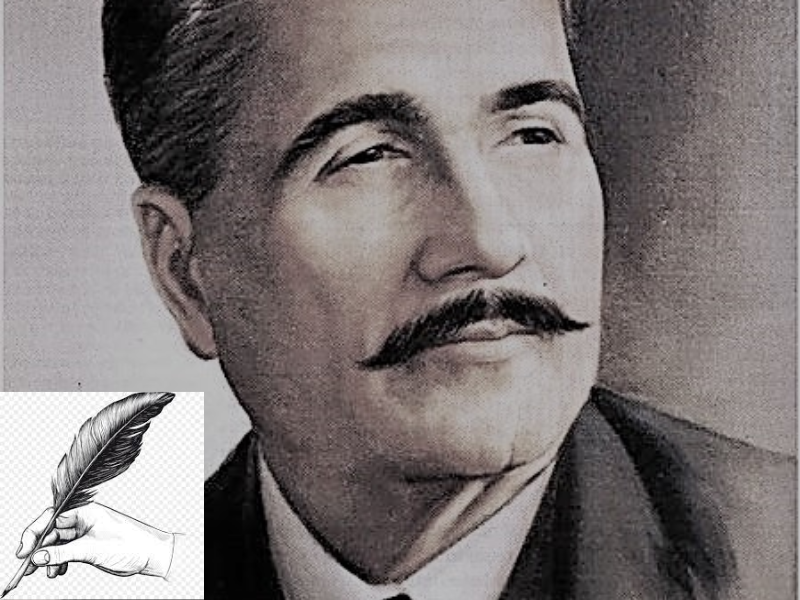
Allama Iqbal Essay
This post aims to write Allama Iqbal essay. In this essay on Allama Iqbal, his contributions to Poetry, Philosophy, Pakistan, and Islam are highlighted.
Table of Contents
Introduction of Allama Iqbal essay:
Allama Muhammad Iqbal was a prominent figure in the history of Indian Muslims. Also, he is known as a national poet in Pakistan. He was born on November 9th, 1877, in Sialkot (now Pakistan). Allama Muhammad Iqbal was an intellectual and a thinker who united Muslims of the Indian subcontinent. His poetry in Persian, Urdu, and English is still being read. His services to Muslims such as religious and political contributions are unforgettable. He foresaw Pakistan’s creation, which became a reality on 14 August 1947.
Iqbal’s Family:
Iqbal’s ancestors originally came from Kashmir. They belonged to the Brahmin caste. However, one of their ancestors converted to Islam and settled in Punjab (now in Pakistan). Iqbal’s father Nur Muhammad was a religious and spiritual man.
Iqbal’s Education:
When Iqbal grew up, his family began to worry about his education. Nur Muhammad put him in a mosque to learn the teaching of the Quran. Iqbal became a bright student and soon attracted the attention of Syed Meer Hassan—his teacher. He completed his primary education at home as well as in school. Then, he went abroad to England and Germany to further pursue his studies. In Europe, he studied philosophy and law and developed a new outlook on the role of religion in modern society.
Iqbal’s Contributions:
While studying in Britain, Iqbal became interested in poetry. He wrote some of his most famous works including “The Secrets of the Self” and “The Reconstruction of Religious Thought in Islam.” He gained immense popularity for his poetic works which are still widely read today. By the early 1900s, Iqbal became a leading voice in the Indian independence struggle. He was an inspiring leader who wrote about the need for unity between Hindus and Muslims. Moreover, he emphasized this unity to achieve freedom from British rule.
Iqbal’s politics:
Iqbal promoted the concept of Khudi, or self-awareness and self-realization. He believed that the concept of khudi should be cultivated by every individual to achieve personal success. He also supported Muslim political organizations such as Allahabad’s Anjuman Himayat-i-Islam and Lahore’s Jamiat al-Ulama-i Hind. Further, he helped them to persuade other Indian Muslims to join the Muslim League. Also, he was a close ally of Muhammad Ali Jinnah, the leader of the All-India Muslim League. Later on, Muhammad Ali Jinnah became the first Governor General of Pakistan.
Conclusion of Allama Iqbal essay:
Iqbal died in 1938, but his legacy lives on in both India and Pakistan. His vision of a separate state for Muslims became reality in the form of Pakistan. He was a source of inspiration around the world with his message of hope and freedom. His poetry is still famous today and is accessible in multiple languages. His translated poetry is available in English, Bengali, Turkish, Dutch, German, and Spanish. Iqbal’s life and work have served as a source of inspiration and guidance. Moreover, He was the most influential figure in South Asian history.
For more useful topics, visit blogtoeducate.com
Related Posts
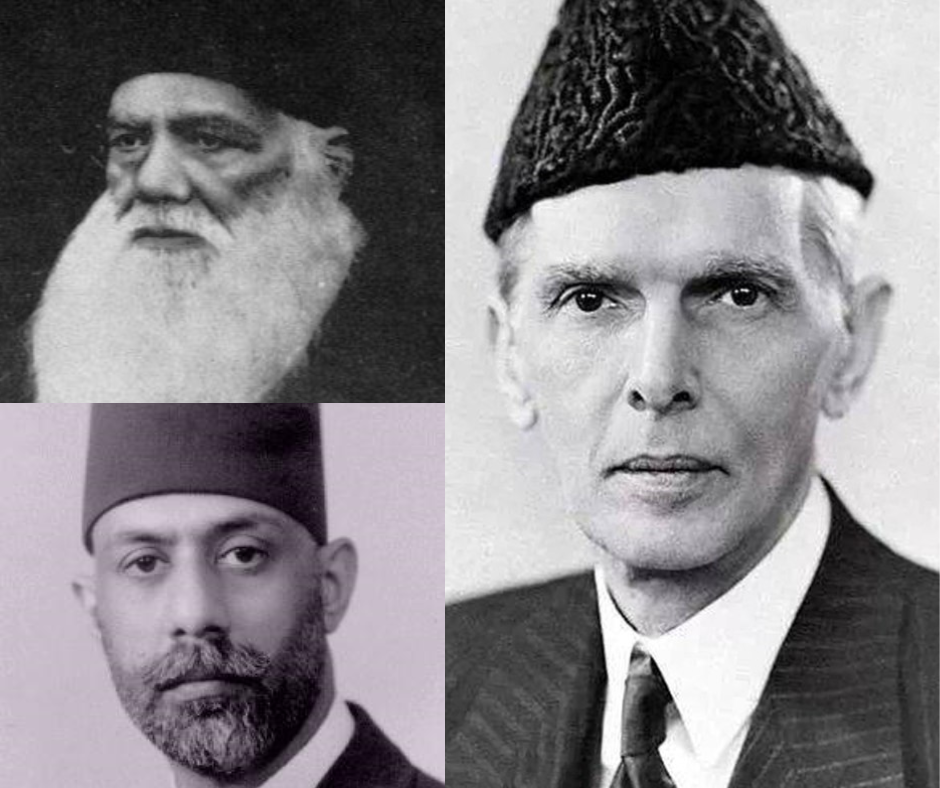
Comments (3) on “Allama Iqbal Essay”
- Pingback: Quaid e Azam essay | Essay on Quaid e Azam | Founder of Pakistan |
- Pingback: AIOU | Allama Iqbal Open University | A Distance Learning University |
- Pingback: Iqbal day poetry, Shayari & Ghazal In Urdu
Leave a Reply Cancel reply
Your email address will not be published. Required fields are marked *
Save my name, email, and website in this browser for the next time I comment.
aaj ik aur baras biit gayā us ke baġhair
jis ke hote hue hote the zamāne mere
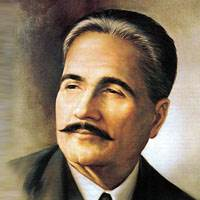
Allama Iqbal
1877 - 1938 | Lahore , Pakistan
One of the greatest Urdu Poets. National poet of Pakistan who penned 'Saare jahaan se achha hindostaan hamara' and 'Lab pe aati hai dua ban ke tamanna meri'
- Index of Poets
- Top Read Poets
- Classical Poets
- Women Poets
- Young Poets
- Poet Audios
E-book 1324
- TOP 20 SHAYARI 21
Image Shayari 22
sitaron se aage jahan aur bhi hain
tere ishq ki intiha chahta hun
kabhi ai haqiqat-e-muntazar nazar aa libas-e-majaz mein
Khirad-mandon se kya puchhun ki meri ibtida kya hai, majnun ne shahr chhoda to sahra bhi chhod de, kyun ziyan-kar banun sud-faramosh rahun, jawab-e-shikwa, dil se jo baat nikalti hai asar rakhti hai, duniya ki mahfilon se ukta gaya hun ya rab, tarana-e-hindi, sare jahan se achchha hindostan hamara, bachche ki dua, lab pe aati hai dua ban ke tamanna meri, sher-o-shayari 134.
ḳhudī ko kar buland itnā ki har taqdīr se pahle
ḳhudā bande se ḳhud pūchhe batā terī razā kyā hai
KHudi ko kar buland itna ki har taqdir se pahle
KHuda bande se KHud puchhe bata teri raza kya hai
maanā ki terī diid ke qābil nahīñ huuñ maiñ
tū merā shauq dekh mirā intizār dekh
agreed I am not worthy of your vision divine
behold my zeal, my passion see how I wait and pine
mana ki teri did ke qabil nahin hun main
tu mera shauq dekh mera intizar dekh
- Translation
sitāroñ se aage jahāñ aur bhī haiñ
abhī ishq ke imtihāñ aur bhī haiñ
abhi ishq ke imtihan aur bhi hain
tire ishq kī intihā chāhtā huuñ
mirī sādgī dekh kyā chāhtā huuñ
meri sadgi dekh kya chahta hun
tū shāhīñ hai parvāz hai kaam terā
tire sāmne āsmāñ aur bhī haiñ
tu shahin hai parwaz hai kaam tera
tere samne aasman aur bhi hain

Insaanon Se Milne Waale Sadmaat Ke Ilaawa Insaan Ki Yaaddaasht Aam Taur Par Kharaab Hoti Hai.
Tahzeeb Eik Taaqatwar Insaan Ki Fikr Hai.
Insaaf Eik Bekaraan Khazaana Hai. Lekin Humein Ise Raham Ke Chor Se Mahfooz Rakhna Chaahiye.
Yaqeen Eik Badi Taaqat Hai. Jab Main Dekhta Hun Ki Dusra Bhi Mere Afkaar Ka Muayyid Hai, To Uski Sadaaqat Ke Baare Mein Mera Etimaad Be-Intiha Badh Jaata Hai.
Afraad Aur Qaumein Khatm Ho Jaati Hain. Magar Unke Bachche Yaani Tasawwuraat Kabhi Khatm Nahin Hote.
kal apne muridon se kaha pir-e-mughan ne
Nahin maqam ki khugar tabiat-e-azad, fitrat meri manind-e-nasim-e-sahari hai, andaz-e-bayan garche bahut shokh nahin hai, ladkian padh rahi hain angrezi, tere sine mein dam hai dil nahin hai, khudi ki khalwaton mein gum raha main, jawanon ko meri aah-e-sahar de, makani hun ki aazad-e-makan hun, tera andesha aflaki nahin hai, iqbal ki daaḍhi aur maulana ka hath, ai chaudhary saahab aaj aap nange hi chale aae, iqbal hamesha der hi se aata hai, himaaqat ka etiraf, moṭar mein kutte.
1985 Ka Iqbaliyati Adab Ek Jaiza
1986 Ka Iqbaliyati Adab Ek Jaiza
A Critical Exposition of Iqbal's Philosophy
A Message From The East
Payam-e-Mashriq Ka English Tarjuma
A New Approch To Iqbal
A Voice From The East
The Poetry of Iqbal
Aaina Khana-e-Iqbal
Aaina-e-Ajam
Aaina-e-Iqbal
Tazminat Bar Kalam-e-Iqbal
Aaina-e-Iqbaliyat
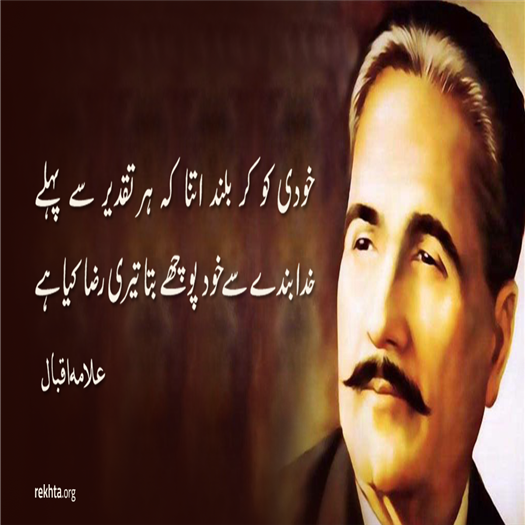
KHudii ko kar buland itnaa ki har taqdiir se pahle KHudaa bande se KHud puuchhe bataa terii razaa kyaa hai
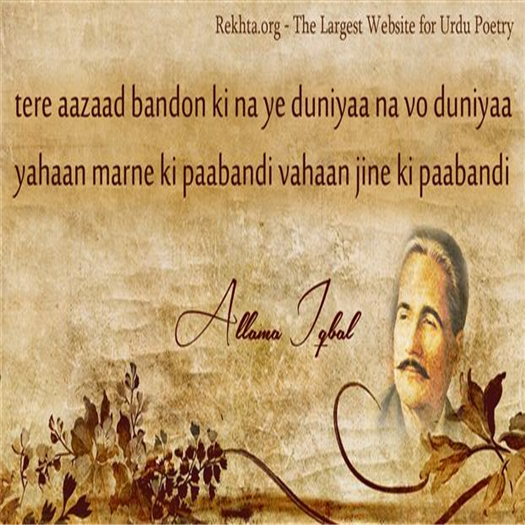
tire aazaad bando.n kii na ye duniyaa na vo duniyaa yahaa.n marne kii paabandii vahaa.n jiine kii paabandii
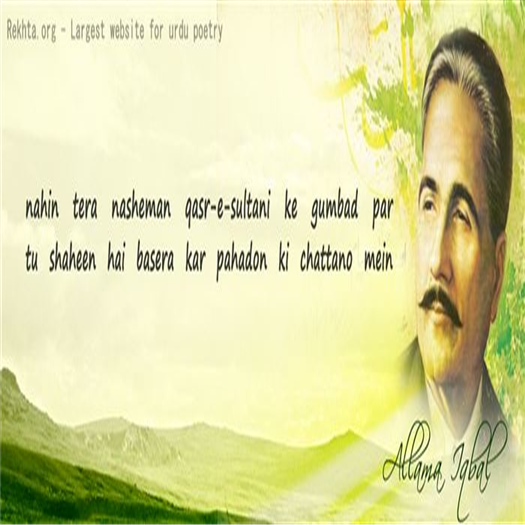
nahii.n teraa nasheman qasr-e-sultaanii ke gumbad par tuu shaahii.n hai baseraa kar pahaa.Do.n kii chaTaano.n me.n

vajuud-e-zan se hai tasviir-e-kaa.enaat me.n ra.ng isii ke saaz se hai zindagii kaa soz-e-daruu.n
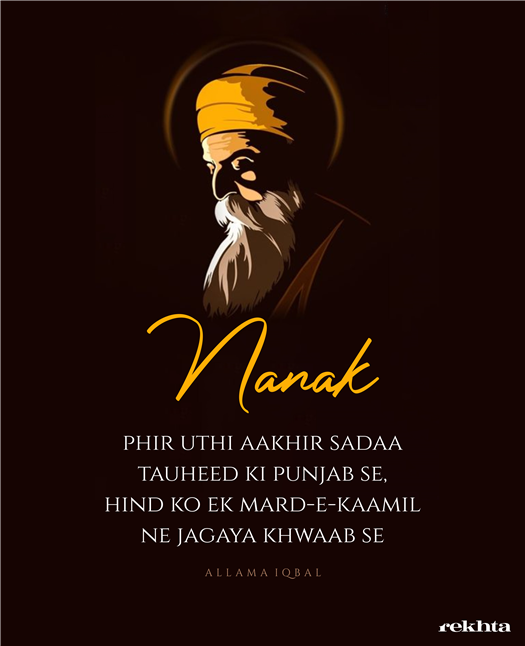
qaum ne paiGaam-e-gautam kii zaraa parvaa na kii qadr pahchaanii na apne gauhar-e-yak-daana kii aah bad-qismat rahe aavaaz-e-haq se be-KHabar Gaafil apne phal kii shiiriinii se hotaa hai shajar aashkaar us ne kiyaa jo zindagii kaa raaz thaa hind ko lekin KHayaalii falsafa par naaz thaa sham-e-haq se jo munavvar ho ye vo mahfil na thii baarish-e-rahmat hu.ii lekin zamii.n qaabil na thii aah shuudar ke liye hindostaa.n Gam-KHaana hai dard-e-insaanii se is bastii kaa dil begaana hai barhaman sarshaar hai ab tak mai-e-pindaar me.n sham-e-gautam jal rahii hai mahfil-e-aGyaar me.n but-kada phir baad muddat ke magar raushan hu.aa nuur-e-ibraahiim se aazar kaa ghar raushan hu.aa phir uThii aaKHir sadaa tauhiid kii punjab se hind ko ik mard-e-kaamil ne jagaayaa KHvaab se
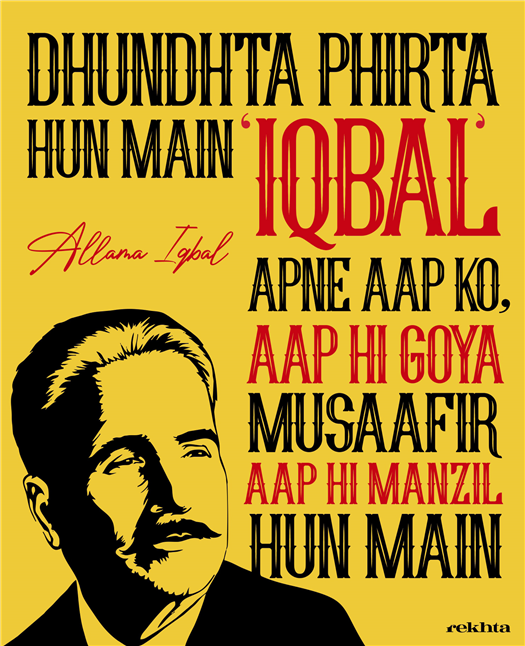
Dhuu.nDtaa phirtaa huu.n mai.n 'iqbaal' apne aap ko aap hii goyaa musaafir aap hii manzil huu.n mai.n
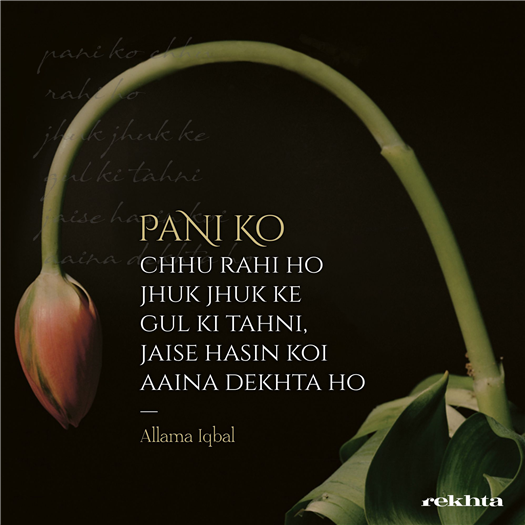
duniyaa kii mahfilo.n se uktaa gayaa huu.n yaa rab kyaa lutf anjuman kaa jab dil hii bujh gayaa ho shorish se bhaagtaa huu.n dil Dhuu.nDtaa hai meraa aisaa sukuut jis par taqriir bhii fidaa ho martaa huu.n KHaamushii par ye aarzuu hai merii daaman me.n koh ke ik chhoTaa saa jho.npa.Daa ho aazaad fikr se huu.n uzlat me.n din guzaaruu.n duniyaa ke Gam kaa dil se kaa.nTaa nikal gayaa ho lazzat sarod kii ho chi.Diyo.n ke chahchaho.n me.n chashme kii shorisho.n me.n baajaa saa baj rahaa ho gul kii kalii chaTak kar paiGaam de kisii kaa saaGar zaraa saa goyaa mujh ko jahaa.n-numaa ho ho haath kaa sirhaanaa sabze kaa ho bichhaunaa sharmaa.e jis se jalvat KHalvat me.n vo adaa ho maanuus is qadar ho suurat se merii bulbul nanhe se dil me.n us ke khaTkaa na kuchh miraa ho saf baa.ndhe dono.n jaanib buuTe hare hare ho.n naddii kaa saaf paanii tasviir le rahaa ho ho dil-fareb aisaa kohsaar kaa nazaara paanii bhii mauj ban kar uTh uTh ke dekhtaa ho aaGosh me.n zamii.n kii soyaa hu.aa ho sabza phir phir ke jhaa.Diyo.n me.n paanii chamak rahaa ho paanii ko chhuu rahii ho jhuk jhuk ke gul kii Tahnii jaise hasiin ko.ii aa.iina dekhtaa ho meh.ndii lagaa.e suuraj jab shaam kii dulhan ko surKHii liye sunahrii har phuul kii qabaa ho raato.n ko chalne vaale rah jaa.e.n thak ke jis dam ummiid un kii meraa TuuTaa hu.aa diyaa ho bijlii chamak ke un ko kuTiyaa mirii dikhaa de jab aasmaa.n pe har suu baadal ghiraa hu.aa ho pichhle pahr kii koyal vo sub.h kii mo.azzin mai.n us kaa ham-navaa huu.n vo merii ham-navaa ho kaano.n pe ho na mere dair o haram kaa ehsaa.n rauzan hii jho.npa.Dii kaa mujh ko sahar-numaa ho phuulo.n ko aa.e jis dam shabnam vazuu karaane ronaa miraa vazuu ho naala mirii du.aa ho is KHaamushii me.n jaa.e.n itne buland naale taaro.n ke qaafile ko merii sadaa diraa ho har dardmand dil ko ronaa miraa rulaa de behosh jo pa.De hai.n shaayad unhe.n jagaa de

maz.hab nahii.n sikhaataa aapas me.n bair rakhnaa hindii hai.n ham vatan hai hindostaa.n hamaaraa
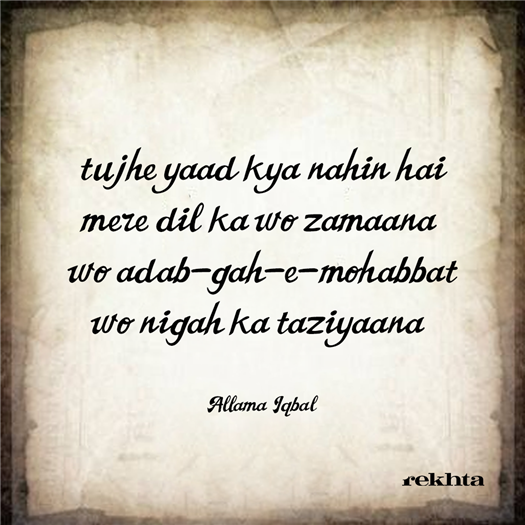
tujhe yaad kyaa nahii.n hai mire dil kaa vo zamaana vo adab-gah-e-mohabbat vo nigah kaa taaziyaana ye butaan-e-asr-e-haazir ki bane hai.n madrase me.n na adaa-e-kaafiraana na taraash-e-aazraana nahii.n is khulii fazaa me.n ko.ii gosha-e-faraaGat ye jahaa.n ajab jahaa.n hai na qafas na aashiyaana rag-e-taak muntazir hai tirii baarish-e-karam kii ki ajam ke mai-kado.n me.n na rahii mai-e-muGaana mire ham-safiir ise bhii asar-e-bahaar samjhe unhe.n kyaa KHabar ki kyaa hai ye navaa-e-aashiqaana mire KHaak o KHuu.n se tuu ne ye jahaa.n kiyaa hai paidaa sila-e-shahid kyaa hai tab-o-taab-e-jaavedaana tirii banda-parvarii se mire din guzar rahe hai.n na gila hai dosto.n kaa na shikaayat-e-zamaana
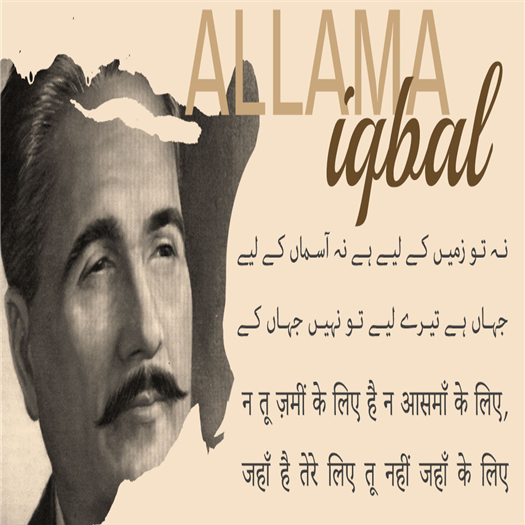
na tuu zamii.n ke liye hai na aasmaa.n ke liye jahaa.n hai tere liye tuu nahii.n jahaa.n ke liye ye aql o dil hai.n sharar shola-e-mohabbat ke vo KHaar-o-KHas ke liye hai ye niistaa.n ke liye maqaam-e-parvarish-e-aah-o-laala hai ye chaman na sair-e-gul ke liye hai na aashiyaa.n ke liye rahegaa raavii o niil o furaat me.n kab tak tiraa safiina ki hai bahr-e-be-karaa.n ke liye nishaan-e-raah dikhaate the jo sitaaro.n ko taras ga.e hai.n kisii mard-e-raah-daa.n ke liye nigah buland suKHan dil-navaaz jaa.n pur-soz yahii hai raKHt-e-safar miir-e-kaarvaa.n ke liye zaraa sii baat thii andesha-e-ajam ne use ba.Dhaa diyaa hai faqat zeb-e-daastaa.n ke liye mire guluu me.n hai ik naGma jibra.iil-aashob sambhaal kar jise rakkhaa hai laa-makaa.n ke liye
Playing videos from section

Muzaffar Ali
Agar kaj-rau hai.n anjum aasmaa.n teraa hai yaa meraa, apnii jaulaa.n-gaah zer-e-aasmaa.n samjhaa thaa mai.n, dil soz se khaalii hai nigah paak nahii.n hai.
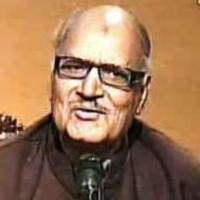
join rekhta family!
Sign up and enjoy FREE unlimited access to a whole Universe of Urdu Poetry, Language Learning, Sufi Mysticism, Rare Texts
Jashn-e-Rekhta | 8-9-10 December 2023 - Major Dhyan Chand National Stadium, Near India Gate - New Delhi
Rekhta Foundation
Devoted to the preservation & promotion of Urdu
Rekhta Dictionary
A Trilingual Treasure of Urdu Words
Online Treasure of Sufi and Sant Poetry
World of Hindi language and literature
The best way to learn Urdu online
Rekhta Books
Best of Urdu & Hindi Books
Allama Iqbal Essay in English

Born on November 9, 1877, Muhammad Iqbal, also known as Allama Iqbal, was a philosopher, poet, and politician in British India. He is regarded as one of the most significant authors of Urdu literature and has written in both Urdu and Persian. He was also referred to as the modern-day Muslim philosopher. Iqbal is referred to as the Poet of the East or Shair-e-Mashriq. He is also referred to as Hakeem-ul-Ummat (“The Sage of the Ummah”) and Muffakir-e-Pakistan (“The Inceptor of Pakistan”). He is also known for his Persian writing. He was acknowledged by the Pakistani government as its “national poet. He has written a variety of stories and books.

His first collection of poetry, Asrar-e-Khudi, was published in Persian in 1915. He also published Rumuz-i-Bekhudi, Payam-i-Mashriq, and Zabur-i-Ajam. His most well-known Urdu writings include Bang-i-Dara, Bal-i-Jibril, Zarb-i Kalim, and a portion of Armughan-e-Hijaz.

Asrar-e-Khudi
He gave a number of lectures in various academic settings, which Oxford Press later compiled into a book titled “The Reconstruction of Islamic Religious Thoughts in Islam.” Iqbal was influenced by Sir Thomas Arnold’s philosophy lessons when he was a student at the Government College in Lahore. Arnold’s lessons convinced Iqbal to pursue further education in the West. He went to England in 1905 to pursue his higher education. Iqbal was admitted to the bar as a barrister from Lincoln’s Inn the same year he received a scholarship from Trinity College in Cambridge and graduated with a degree in arts.
Iqbal moved to Germany in 1907 to pursue a doctorate, and in 1908 he received his Ph.D. from Ludwig Maximilian University in Munich. Iqbal started producing poetry in Persian while he was a student in Europe. He gave it a priority because he thought he had discovered a simple means of articulating his ideas.
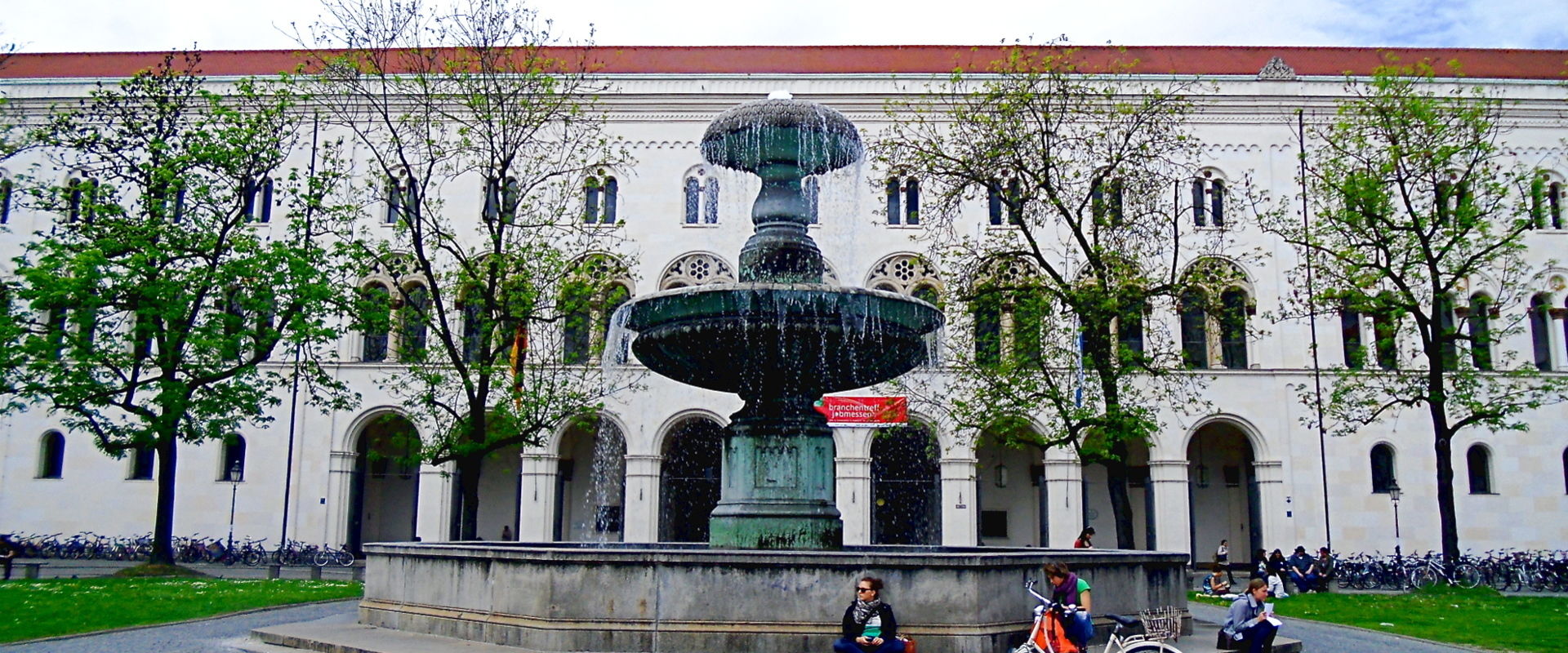
Ludwig Maximilian University in Munich
Throughout his life, he kept up his Persian writing. Iqbal began his career as a reader of Arabic at Oriental College after earning his Master of Arts degree there in 1899. Shortly after, he was chosen to become a junior professor of philosophy at Government College Lahore, where he had previously been a student. Iqbal worked there until he left for England in 1905. Iqbal rejoined the same college in 1908 after his return from England as a professor of philosophy and English literature. Iqbal started practicing law at Chief Court Lahore around the same time, but he soon gave up the practice to focus on writing and became an active member of Anjuman-e-Himayat-e-Islam.
He was appointed general secretary of the same organization in 1919. Iqbal’s ideas, which are based on his travels and stays in Western Europe and the Middle East, are primarily concerned with the spiritual advancement and development of human society. Western philosophers like Friedrich Nietzsche, Henri Bergson, and Goethe had a significant impact on him.
Mawlana Rumi’s poetry and philosophy had the greatest impact on Iqbal’s thoughts. Iqbal, who has been deeply rooted in religion since childhood, started focusing intensely on the study of Islam, the culture and history of Islamic civilization, and the future of Islam in politics while embracing Rumi as his mentor.
Iqbal played a major part in the political movement of Muslims. Iqbal continued to be involved with the Muslim League. He opposed both the Khilafat movement and India’s participation in World War I, and he maintained close contact with prominent Muslim politicians like Maulana Mohammad Ali and Muhammad Ali Jinnah.
Iqbal was ideologically apart from the Muslim leaders in Congress and had lost faith in Muslim League politicians as a result of the League’s factional strife in the 1920s. Iqbal, who had grown dissatisfied with factional leaders like Sir Muhammad Shafi and Sir Fazl-ur-Rahman, came to believe that only Muhammad Ali Jinnah could uphold this unity and accomplish the League’s goals for Muslim political empowerment. Iqbal convinced Jinnah to end his self-imposed exile in London, return to India, and take control of the League as a result of their close, personal relationship.
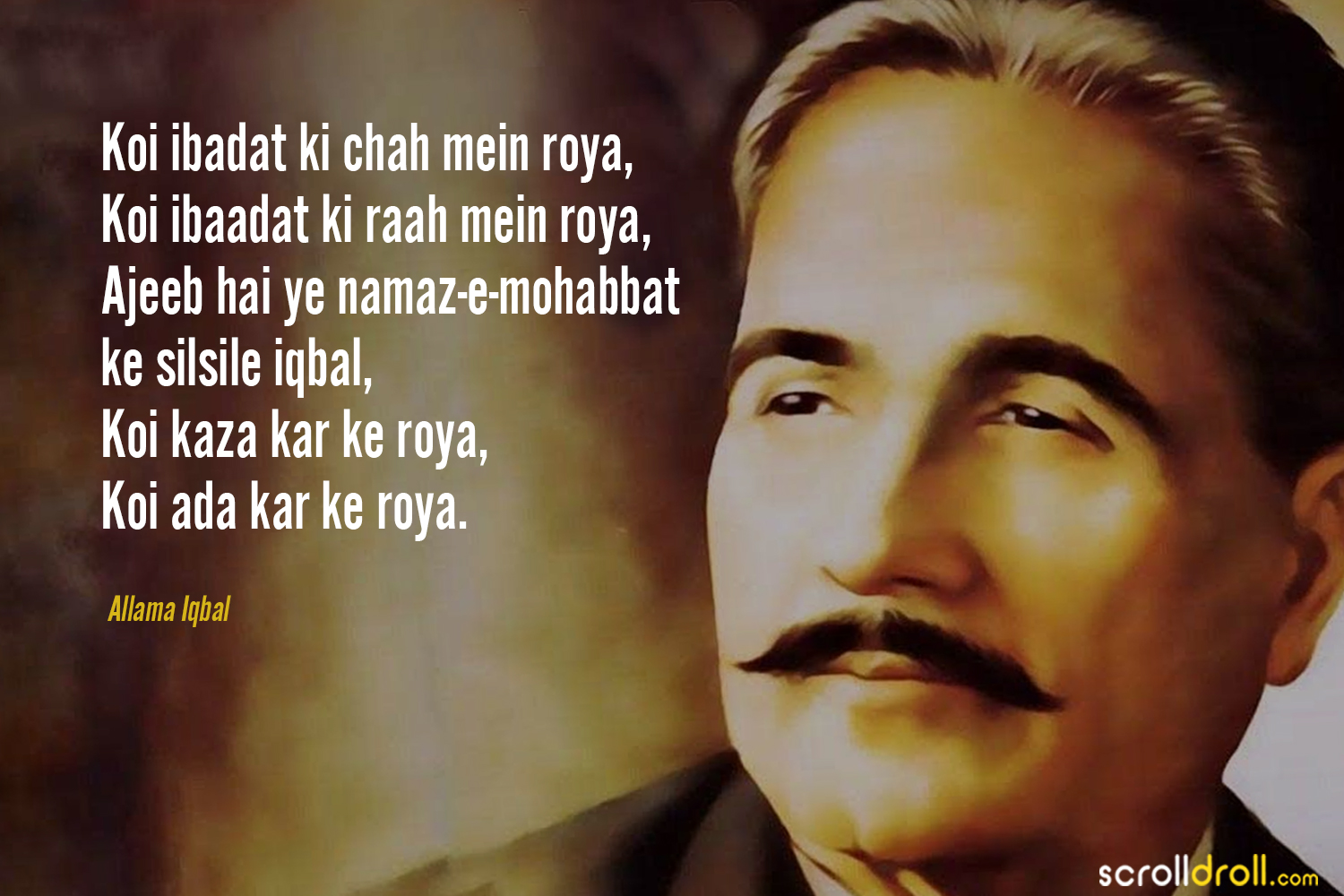
In addition to his literary works in Urdu and Persian, Iqbal also wrote numerous letters in the English language and two books on the subjects of ‘The Reconstruction of Religious Thought in Islam’ and ‘The Development of Metaphysics in Persia’. In which he discussed his views on Islamic Sufism and Persian ideology, particularly his convictions that Islamic Sufism awakens the seeking soul to a higher understanding of existence. Along with other political, social, and religious issues, he also spoke about philosophy, God, the purpose of prayer, the human spirit, and Muslim culture.
Allama Iqbal’s personality has made an enduring impression on the history of Pakistan. He made an effort to rouse the Indian Muslims through his politics, poetry, and philosophy. He introduced India’s Muslims to the concept of independence. Iqbal passed away on April 21, 1938.
- Home Tutor In Islamabad
- Home Tutor In Karachi
- Home Tutor In Rawalpindi
- Home Tutor In Lahore
- Online Tutor
- A Level Tutor
- O Level Tutor
- English Tutor
- Gmat Preparation
- IELTS Preparation In Karachi
- Physics and Maths Tutor
- Top 25+ Best Colleges List in Karachi
- List Of Best COACHING CENTERS IN KARACHI 2021 Updated
- List Of Top Government Universities In Karachi
- List Of Best Universities For BBA In Karachi 2021
- List of Top 20 Engineering Universities In Pakistan Updated
- List of Best O Level schools in Lahore
- Boarding School In Karachi
- Physics A Level Past Papers
- WORRIED ABOUT YOUR CHILD’S EDUCATION?
- Benefits and disadvantages of private tutoring
- Write For Us
- Best A-LEVEL COLLEGES IN KARACHI
- Private School in Karachi
- List Of Best Schools in Islamabad 2021 Updated
- Best O level schools in Karachi
- O Level In Pakistan
- List Of Best School in Lahore
- List Of Best Colleges in Lahore 2022 Updated
- List Of 21+Best Schools in Karachi 2021 Updated
- Here is List Of Best Schools In Pakistan
- List Of Best 21 HI-TEA IN LAHORE 2021 Updated
- LIST OF BEST MBA UNIVERSITIES IN KARACHI UPDATED

0332 0203664
0332 3124755
Start typing and press Enter to search


Allama Iqbal Essay & Paragraph In English For Students
Paragraph on Allama Iqbal: Poet Iqbal is one of the names in the golden pages of history. Allama Dr Muhammad Iqbal birth date is November 9, 1877 in the historical city of Sialkot.
His ancestral homeland was Kashmir. Your father Sheikh Noor Mohammad was a religious and Sufi man. His mother was also a very religious woman. He received his early education at Sialkot. Then, he joined Government college Lahore and did his MA in Philosophy there.
Table of Contents
Write A Brief Paragraph On Allama Iqbal | For Class 7, 8, 9 & 10th class Students
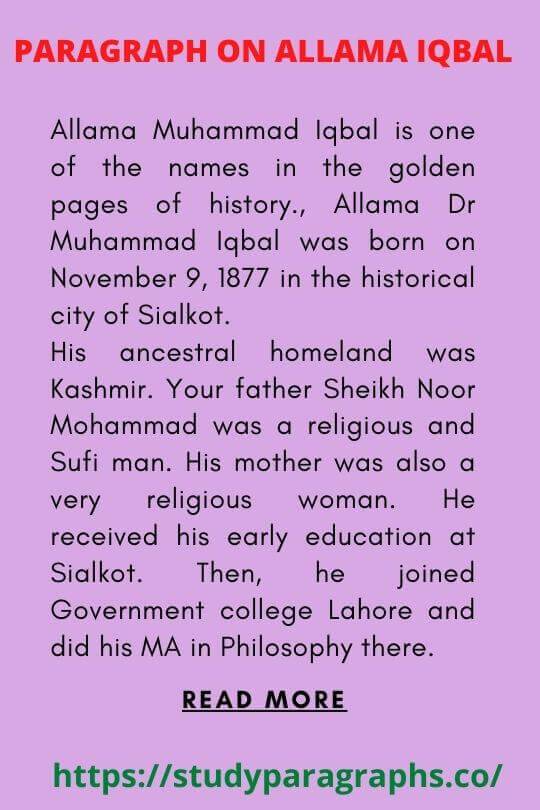
He worked as a lecturer in Philosophy in Government college, Lahore. Then, he went to England for higher studies. From Germany he did his PhD in philosophy he also obtained the degree of Bar-at-law from the Cambridge University. At the same time you gave six lectures on the subject of Islam which became very popular.
His stay in Europe was of great importance. He have come to the conclusion that Western civilization is based on false principles and is destructive to humanity. He returned home in 1908 and stayed in Lahore.
He practiced law for some time but did not make it a permanent profession . He devoted his most of time to poetry, philosophy and religion. In fact, he had great love for the Muslims of the Indian subcontinent. His poetry was the source to awaken the Muslim nation.
He was a great poet. A great force was created in his poetry and gradually the effect of the true teachings of Islam began to appear in his poetry. He composed many poems on the glory of the Islamic power and civilization.
In 1930, Allama Iqbal was elected President of the All India Muslim League. In his address at Allahabad, he presented the two Nation theory. This idea gave a definite direction to the struggle of the Indian Muslim for a separate homeland Pakistan . He prepared the Muslim nation mentally for independence and establishment of Pakistan through his poetry.
Allama Iqbal not only presented the concept of Pakistan but also gave very useful advice to Quaid-e-Azam in this regard. Allama Iqbal awakened the Muslims from their slumber and instilled in them the spirit of freedom and liberty. He tried to make all Muslims realize that they can regain their lost place. He created a new spirit in Muslims through his poetry.
Poetry Of Allama Iqbal
A poet like Allama Iqbal is born centuries later. He is one of our greatest poets. He wrote in both Urdu and Persian. Several collections of his poems have been printed . “Bang-e-Dara”, “Bal-e-Jabril”, “Asrar-e-Khudi”, “Pyam-e-Mashriq”, “Zarb-e-Kalim” , “Sheqwa”, “Jawab-e-Sheqwa” and “Javid Nama” are some of them. Iqbal used the word “Eagle” as a symbol for the energetic Muslim youth. He also presented the concept of “Khudi”. This concept gave a new life to the Muslims of India and make them one nation.
Allama Iqbal introduces Islamic principle and Quranic theories in his poetry. Iqbal guides us toward our faith and our love of Allah almighty. He says that we must have unflinching faith in Allah almighty and having no faith is worse than slavery. He passed away on April 21, 1938. He was buried near the gate of Badshai Mosque, Lahore.
FAQ On Allama Iqbal Essay
What is Allama Iqbal famous for?
Allama Iqbal was a famous philosopher, poet, and politician in South Asia. He is famous for his contributions to the literature of to Urdu and Persian languages and for political activism for the creation of a separate Muslim country in Hindustan. Iqbal is believed one of the most important person in Asian history. His works continue to influence political and cultural discourse in the region.
What is the moral of Iqbal?
The moral of Allama Iqbal’s poetry is focused around the themes of pursuit of truth, self-discovery, individual responsibility. He lessened his readers to think critically, to get knowledge, and to cultivate a strong sense of self. He also worked for the importance of freedom and independence of nation and individuals.
What is the composition of Allama Iqbal?

Hello! Welcome to my Blog StudyParagraphs.co. My name is Angelina. I am a college professor. I love reading writing for kids students. This blog is full with valuable knowledge for all class students. Thank you for reading my articles.
Related Posts:
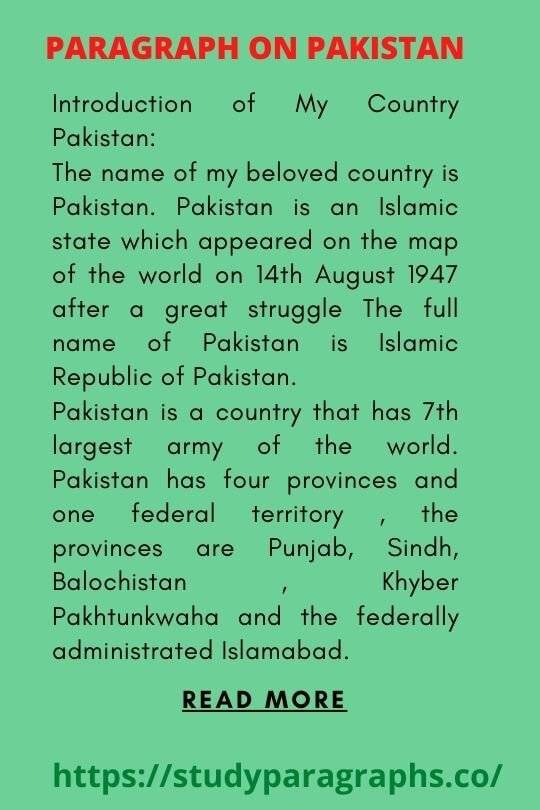
- Privacy Policy

Allama Iqbal English Essay
Allama muhammad iqbal essay.
- Informal Letters
- Personal Letters
- English Stories with moral lessons
- Applications to the Principal
- English Stories
- Business Letters
Allama Iqbal Essay
- The Holy Quran
- Quaid-e-Azam
- My Best Friend
- My Neighbour
- A True Muslim
- A Visit to Museum
- A Visit to a Hill Station
- A visit to a Historical Place
- A Hockey Match
- More Essays>>>
plz may increase this essay its very short for 2nd year student
Post a Comment
Trending Topics
Latest posts.
- 2nd year English guess paper 2024 for Punjab Boards
- 2nd year chemistry guess paper 2024 Punjab board
- 2nd year guess paper 2024 Punjab board
- 2nd Year English Complete Notes in PDF
- 2nd year all subjects notes PDF Download
- 2nd Year Part II Book II Questions Notes free PDF Download
- Important English Essays for 2nd Year 2023
- 1st year Past papers solved and unsolved all Punjab Boards
- 2nd year past papers solved and unsloved all Punjab boards
- 2nd year chemistry Short questions notes pdf
- 9th class guess paper 2024 pdf
- 9th class general science guess paper 2024 pdf download
- 9th class physics guess paper 2024 pdf download
- 9th class Islamiat Lazmi guess paper pdf 2024
- 9th class Urdu guess paper 2024 pdf download
- BISE Hyderabad
- BISE Lahore
- bise rawalpindi
- BISE Sargodha
- career-counseling
- how to pass
- Punjab Board
- Sindh-Board
- Solved mcqs
- Student-Guide

100-300 Words Paragraph On Allama Iqbal In English
Allama Iqbal was born in Sialkot, Punjab, British India, on November 9, 1877. His father and a nearby mosque provided him with an early education in Islamic subjects. After his family relocated to Lahore in 1895, he studied at the Government College University (Lahore) and earned a Bachelor of Arts degree.
He is widely considered as one of the twentieth century’s most prominent Muslim philosophers and poets. Iqbal, known as the “Poet of the East,” is widely credited with inspiring the Pakistan Movement, which resulted in the establishment of Pakistan.
More than thirty books of poetry, including Rumuz-e-Bekhudi, Payam-i-Mashriq, and Bang-e-Dara, elegies like Barrasi Kashmir, philosophical works like The economics of the Indian (Hindustani) condition, and political works like The Secrets of the Self, are among his works. He also composed four acts of the lyrical play and four short stories.
October 11, 1930, is a watershed moment in Muslim India’s history. On this day, Allama Muhammad Iqbal delivered his legendary Iqbal Lahore address at the Muslim League session in Allahabad for the first time. The address was written in a clear and straightforward manner. And its goal was to persuade and convert many Indian Muslims to choose to join an independent state free of British dominance and Hindu sovereignty.
Related Posts:
- Random Harry Potter Character Generator
- Stri Purush Tulana by Tarabai Shinde Analysis
- Short Essay on Quit India Movement
- Speech on Allama Iqbal in English for All Classes
- Goblin Market Poem by Christina Rossetti Summary, Notes and Line by Line Explanation in English
- Howl Poem By Allen Ginsberg Summary, Notes and Line by Line Explanation in English

COMMENTS
This is a very simple and easy-to-learn essay in English for all class students. Every student can prepare Allama Iqbal Essay in English from here according to his/her choice. Allama Iqbal Essay in English (Easy) Allama Iqbal is our national poet. Allama Muhammad Iqbal" was born in Sialkot on November 9, 1877. His forefathers came from Kashmir.
500 Words Essay on Allama Iqbal in English. Allama Iqbal was undoubtedly a prestigious National hero born in Sialkot. He was an outstanding poet-philosopher and political leader. However, writing an essay on such great personalities requires enormous time and research to do complete justice. Hence, availing help from expert essay writers can ...
Allama Iqbal Essay: Allama Iqbal Essay includes early life, education, literary and philosophical contributions, and enduring legacy. Throughout British India's history, Allama Iqbal was known as a great poet, philosopher, and politician. Muhammad Iqbal was his full name. Iqbal holds a special place in British India's history as a great ...
Introduction to Allama Muhammad Iqbal (Essay On Allama Iqbal ): Allama Muhammad Iqbal, often called Allama Iqbal, was a famous poet, philosopher, and thinker from Pakistan.He was born on November 9, 1877, in Sialkot, which is a part of Pakistan.
Today I write an allama iqbal essay in English with headings, pdf, and quotations for classes 3,6,4,5,7,8,9,1,2, and 10th in small, easy, and short wording. Allama Iqbal is one of the most prominent figures in Urdu literature and Pakistani history. Dr Allama Muhammad Iqbal was a renowned poet, mystic, philosopher, and political activist who was pivotal in the Pakistan Movement.
Also Read: Allama Iqbal Shayari on Life, love, and Inspiration. Essay on Allama Iqbal in 450 Words. Allama Iqbal is known for his influential efforts in directing his fellow Muslims in British-administered India toward the idea of establishment of a separate Muslim State. This aspiration was eventually realized during The Partition of 1947.
Essay on Allama Muhammad Iqbal in English with Quotations. Allama Iqbal was the great poet-philosopher and active political leader born at Sialkot, Punjab, in 1877. He descended from a family of Kashmiri Brahmans, who had embraced Islam about 300 years earlier. Allama Iqbal received his early education in the traditional Madrassa.
Essay on Allama Iqbal. Allama Iqbal is one of the most influential Muslim thinkers. Allama Iqbal was one of the greatest philosophers, and poets as well as an active political leader. His poetry is quite famous and had a great impact on Pakistan's freedom movement. Mohammad Iqbal was born on the 9th of November 1877, in the city of Sialkot.
This essay will explore the life and legacy of Allama Iqbal, focusing on three key aspects of his contributions to Pakistani culture and politics. Allama Iqbal was a philosopher, poet, and politician who played a key role in the creation of Pakistan. Born in Sialkot, Punjab, in 1877, Iqbal completed his education in Lahore before traveling to ...
Allama Iqbal essay in English for class 1. Allama Iqbal, a distinguished poet and intellectual figure in Pakistan, came into the world on 9th November 1877 in Sialkot, a city situated in Punjab. Proficient in both Urdu and Persian languages, he earned the title of the "Poet of the East.". Deeply devoted to his country and religion, Allama ...
Sir Muhammad Iqbal (November 9, 1877 - April 21, 1938), widely known as Allama Iqbal, was a Muslim poet and philosopher.Allama Iqbal gave the idea of Pakistan.He became the national poet of Pakistan after his death. He is also known as the poet of East. He wrote poetry in Urdu and Persian.His poetry is considered to be revolutionary. His vision of an independent state for the Muslims of ...
The poet and philosopher Allama Iqbal (1877-1938. was one of the greatest poets and thinkers of modern times. He was born in Sialkot, British India, and received his early education at Sialkot Zilla School. In 1894, he became a disciple of Maulana Muhammad Ali, the chief minister of Punjab. In 1899, he went to England for higher studies.
Allama Muhammad Iqbal the national poet of Pakistan died on the 21st of April, 1938, but his remarkable work and stand for Muslims will remain alive throughout our lives. He lies buried next to the Badshahi Mosque in Lahore. A few of his most renowned books are; Shikwa, jawab-e-shikwa, Armaghan-e-Hijaz, Bal-e-Jibrael, and others gave him a lot ...
He died in 1938 and was buried in Lahore. Short Essay on Allama Iqbal in English - Iqbal is known for immense success and accomplishments. Born in Sialkot in 1877, he had a keen interest in languages namely Urdu, Arabic, and Persian. In college, he took philosophy and even taught it for a few years.
An Essay in English on Allama Iqbal. Why Allama Iqbal's Ideas Matter. The Legacy of Allama Iqbal. Inspiring Thoughts from Allama Iqbal. Open in New Tab Download. How to Download: To download the PDF on Allama Iqbal, just click on the "Download" button given above.
Allama Muhammad Iqbal was an intellectual and a thinker who united Muslims of the Indian subcontinent. His poetry in Persian, Urdu, and English is still being read. His services to Muslims such as religious and political contributions are unforgettable. He foresaw Pakistan's creation, which became a reality on 14 August 1947.
100 Words Essay On Allama Iqbal In English. Muhammad Iqbal is Allama Iqbal's full name. Sir Muhammad Iqbal was born on November 9, 1877, in Punjab, India, and died on April 21, 1938. He lived for 61 years. He suffered for a long time due to throat disease and thereafter passed away. He had an arranged marriage and had two daughters.
Allama Iqbal Short Essay. Allama Muhammad Iqbal was born in Sialkot on 9th November 1877. His father Shiekh Noor Muhammad was a pious man. He passed his F.A from Murray College Sialkot. He got the degree of Phd from Germany. He wrote many poems to awake the Muslims. He is our national poet. He taught Muslims the sense of self-respect.
mana ki teri did ke qabil nahin hun main. tu mera shauq dekh mera intizar dekh. sitāroñ se aage jahāñ aur bhī haiñ. abhī ishq ke imtihāñ aur bhī haiñ. sitaron se aage jahan aur bhi hain. abhi ishq ke imtihan aur bhi hain. tire ishq kī intihā chāhtā huuñ. mirī sādgī dekh kyā chāhtā huuñ. tere ishq ki intiha chahta hun.
Allama Iqbal Essay in English Born on November 9, 1877, Muhammad Iqbal, also known as Allama Iqbal, was a philosopher, poet, and politician in British India. ... Throughout his life, he kept up his Persian writing. Iqbal began his career as a reader of Arabic at Oriental College after earning his Master of Arts degree there in 1899. Shortly ...
Write A Brief Paragraph On Allama Iqbal | For Class 7, 8, 9 & 10th class Students. He worked as a lecturer in Philosophy in Government college, Lahore. Then, he went to England for higher studies. From Germany he did his PhD in philosophy he also obtained the degree of Bar-at-law from the Cambridge University.
Allama Iqbal Essay. Allama Iqbal is our national poet. He was born at Sialkot on November 9, 1877. He belonged to a respectable Kashmiri family. One of his forefathers left Kashmir and settled in Sialkot. His father Sheikh Noor Muhammad was a pious and religious man. Allama Iqbal inherited mysticism and deep love for his religion from his parents.
Allama Iqbal was born in Sialkot, Punjab, British India, on November 9, 1877. His father and a nearby mosque provided him with an early education in Islamic subjects. After his family relocated to Lahore in 1895, he studied at the Government College University (Lahore) and earned a Bachelor of Arts degree. He is widely considered as one of the ...